Have you started planning out what flowers you're going to include in your garden?
There are lots of options to choose from, all ranging in size, color, and much more. One of the most dazzling flower colors is pink! Adding pink flowers to your garden design instantly charms the landscape.
To help you figure out which flowers to get, we created a list of 35 stunning pink flowers!
These flowers vary greatly, so you're sure to find the right ones that match your gardening needs and vision. So without further ado, let's get to it.
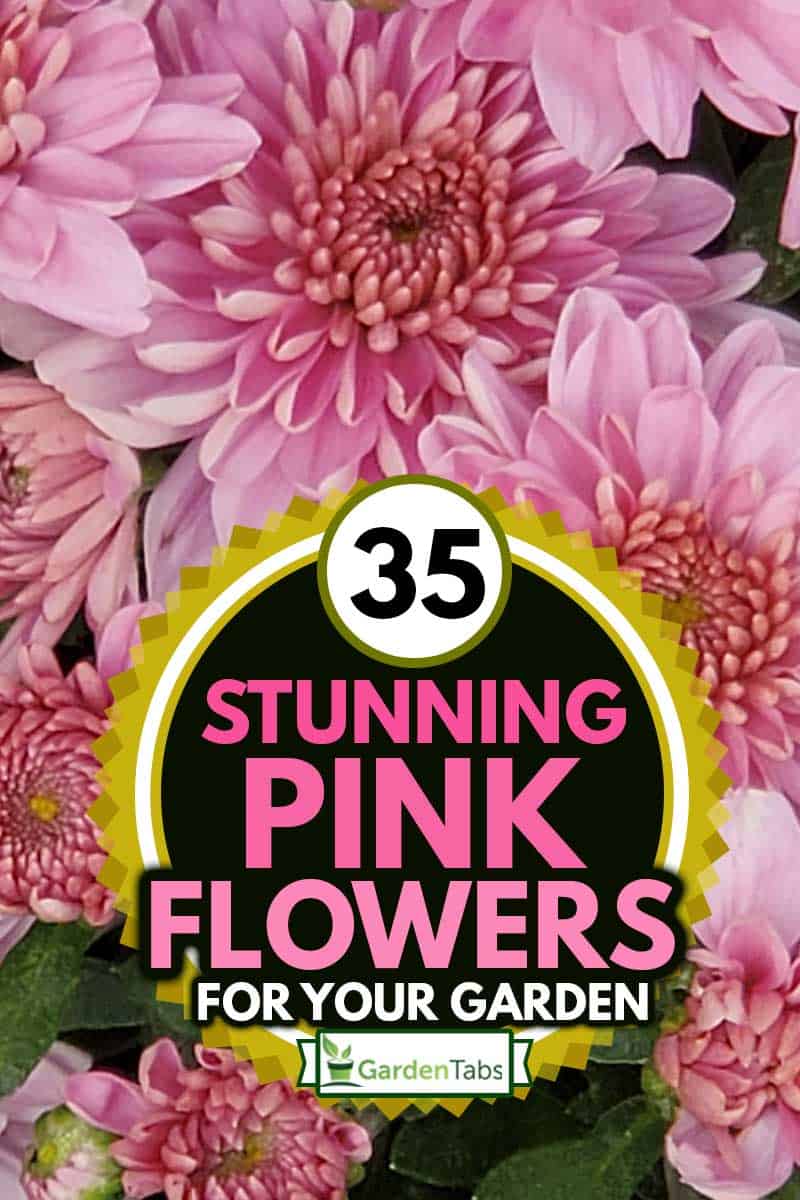
1. Sizzling Pink Fringe Flower
This plant features deep burgundy foliage that's topped with clusters of pink, fringed flowers. It blooms repeatedly throughout the year. The shrub reaches between 4 and 6 feet in height and 4 to 5 feet in width.
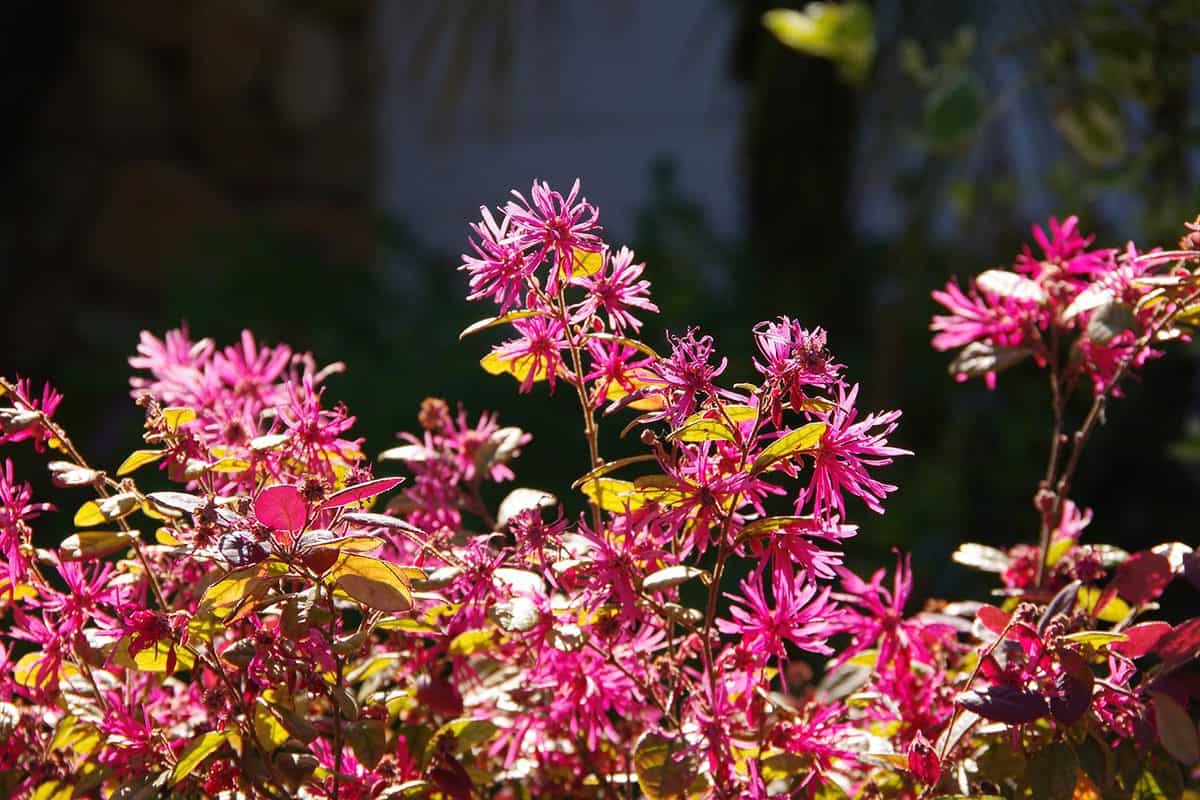
Its Latin name is Loropetalum chinense.
The sizzling pink fringe flower performs best in USDA plant hardiness zones 7 through 9. The plant needs partial to full sun and regular watering.
2. Pink Mist Pincushion
The pink mist pincushion plant features dainty, soft-colored pink blooms on tall, thin stems.
The lavender-pink blooms feature a pincushion-like center. Its gray-green foliage is clumping. The plant can grow up to 15 inches tall and wide.
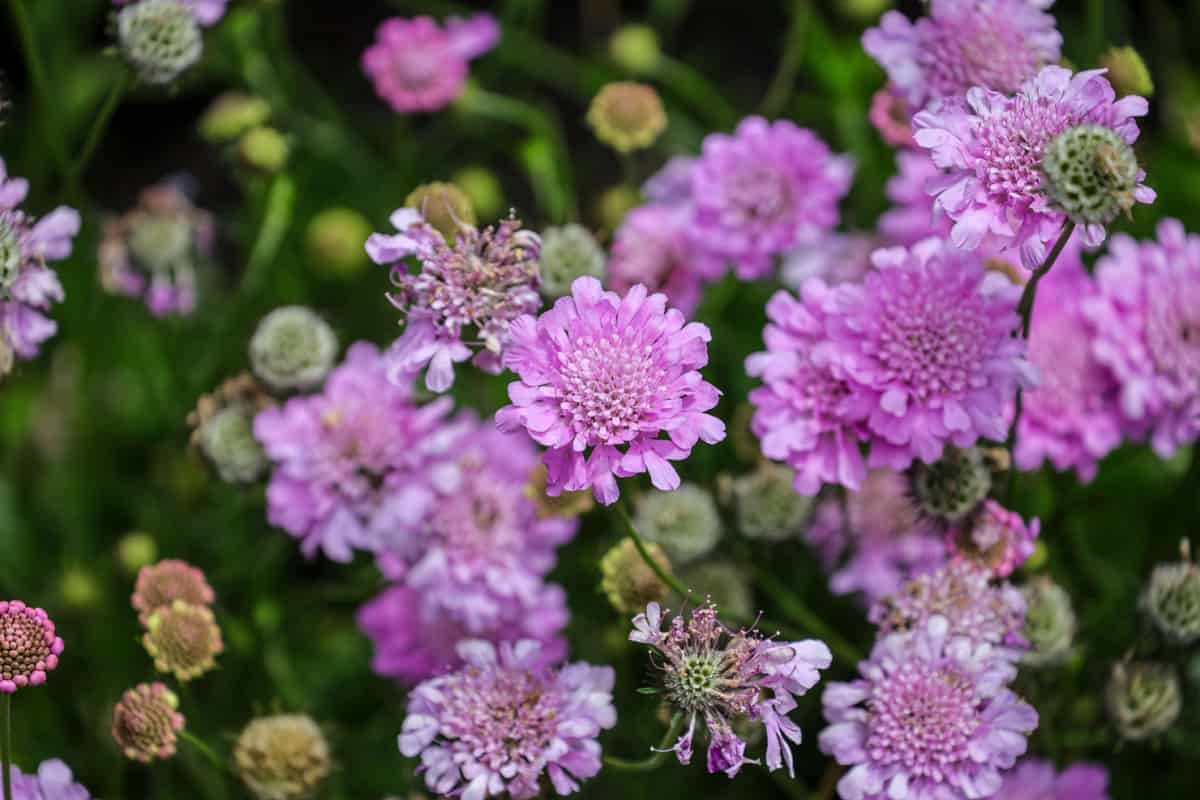
Its Latin name is Scabiosa columbaria.
This plant performs best in USDA plant hardiness zones 3 through 8. It requires regular watering and full sun for optimal health.
3. Pink Balloon Flower
The pink balloon flower features interestingly-shaped pale pink blooms. The blooms resemble a blown-up balloon that opens into a star shape. It reaches between 8 and 10 inches tall and wide.
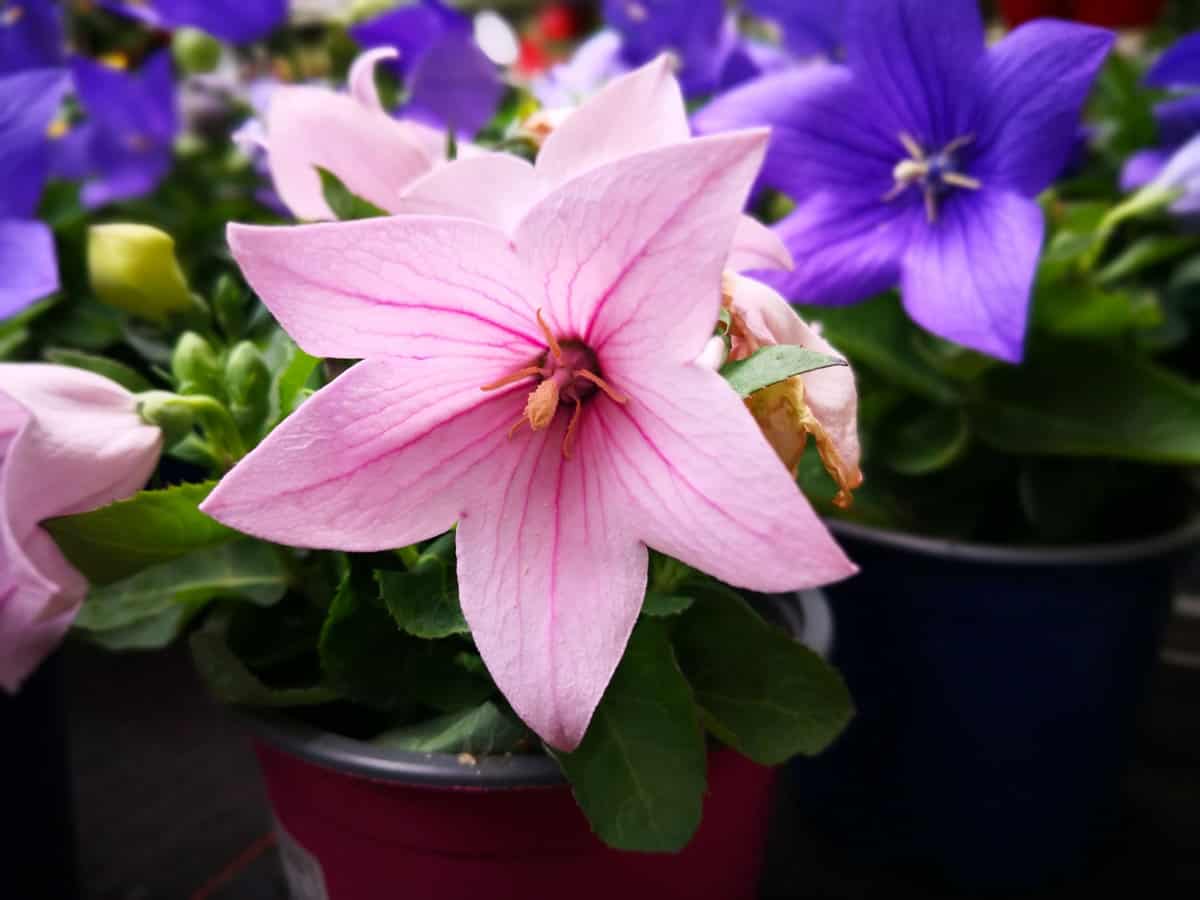
Its Latin name is Platycodon.
This flower performs best in USDA plant hardiness zones 5 through 9. Water it regularly, but only once the top few inches of soil have dried. Plant it in a spot with partial to full sun.
4. Pink Rice Flower
The pink rice flower is an upright-growing plant that features compact clusters of tiny flowers that vary in shades of pink.
The long, slender stems are fine-textured. It grows between 3 and 5 feet in height and 2 to 4 feet in width.
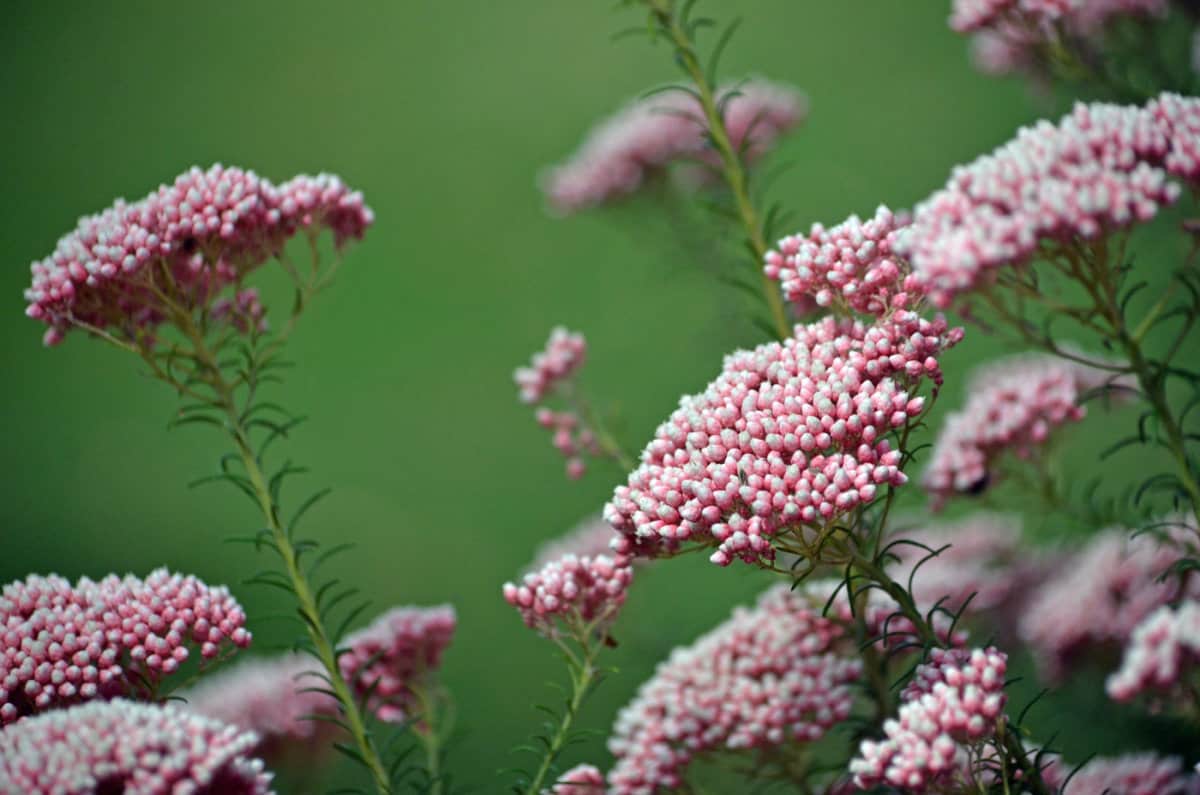
Its Latin name is Ozothamnus diosmifolius.
This plant does best in USDA plant hardiness zones 9 through 11. It needs full sun and needs occasional watering once it has been established.
5. Windflower
Windflowers, also called Anemones, provide stunning pink blooms through the summer and fall months.
The blooms sit atop long, slender, dark green stems and a mass of foliage. Its habit is compact. It reaches up to 16 inches in height and 24 inches in width.
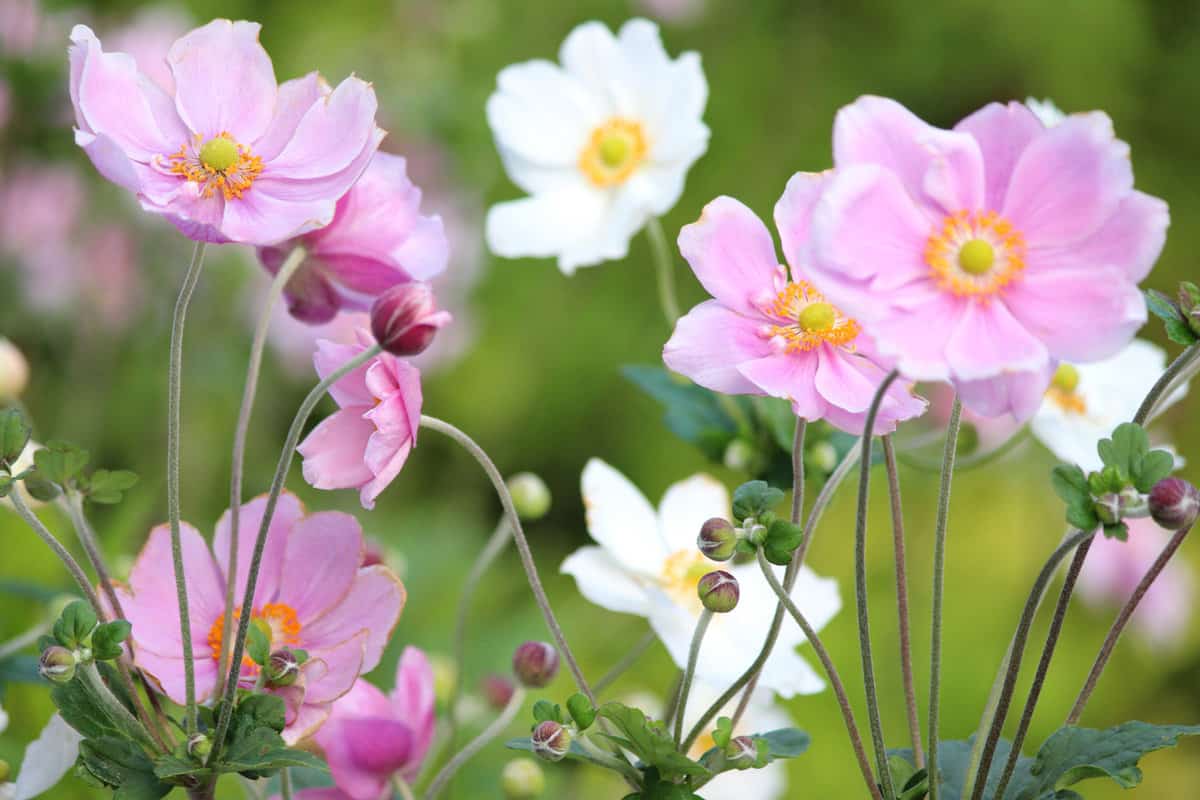
Its Latin name is Anemone hupehensis.
The windflower performs best in USDA plant hardiness zones 5 through 9. Plant it in a spot that receives partial to full sun. Water it enough to keep the soil moist.
6. Allium
Allium has a unique globe shape full of 2 to 3-inch clusters of small pink flowers. The clusters sit atop tall stems that measure between 8 and 10 inches tall.
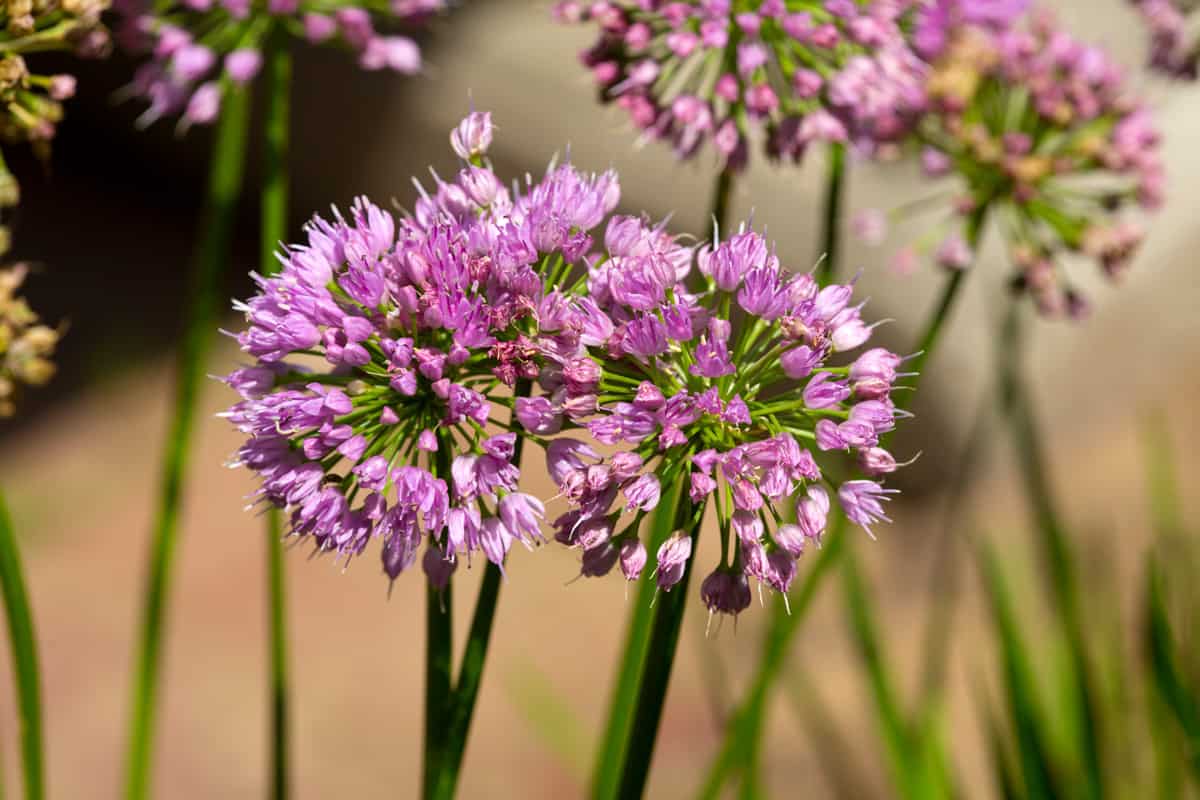
Its Latin name is Allium and it has quite a few species variations.
Allium does best in USDA plant hardiness zones 4 through 9. It should be watered regularly and positioned in a spot with full sun.
7. Astilbe
Astilbe features incredibly unique fluffy spikes that extend beyond the dark green foliage. When in bloom, the plant stands up to 15 inches tall and between 12 and 24 inches wide.
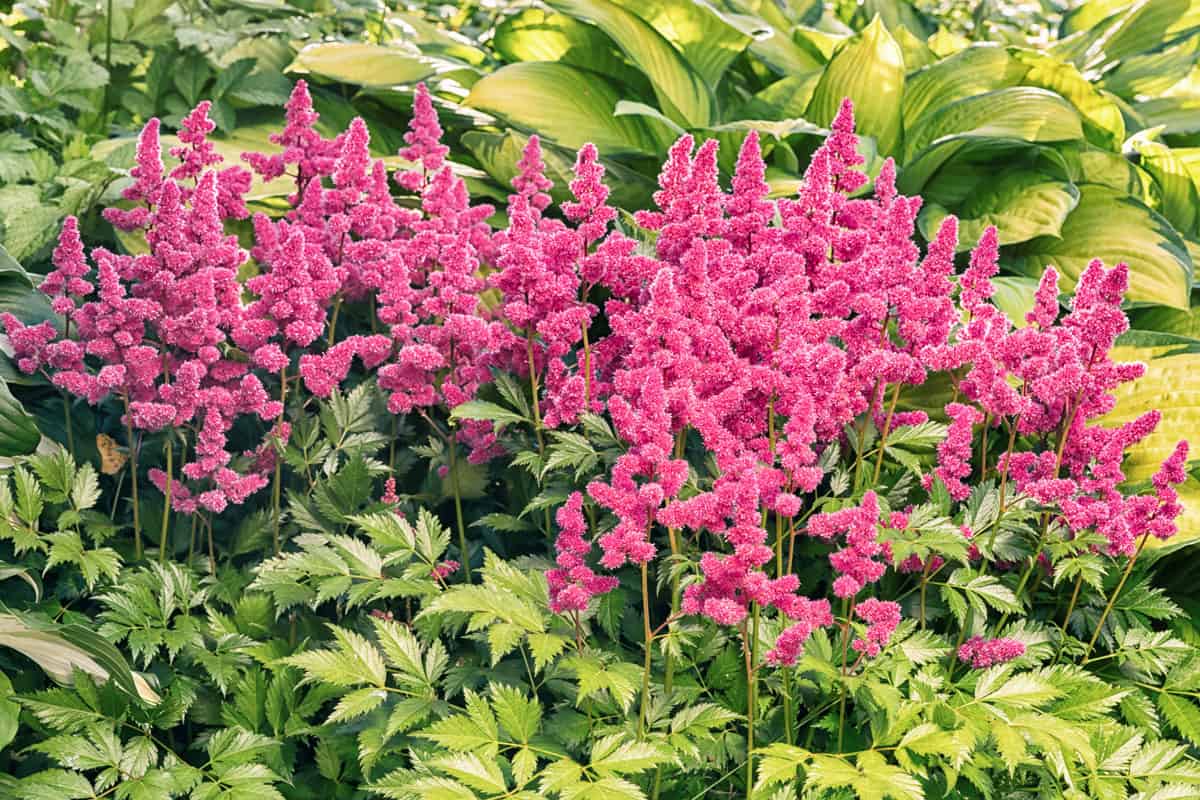
Pink astilbe's Latin name is Astilbe simplicifolia.
For optimal performance, grow astilbe in USDA plant hardiness zones 4 through 9. It should be planted in a spot that has full shade or filtered sunlight. Ensure that the soil is kept evenly moist.
8. Begonia
The begonia plant features pastel pink blooms that sit on dark green foliage. Its blooms are plentiful and prolific. The plant reaches between 16 and 20 inches in height and 20 to 24 inches in width.
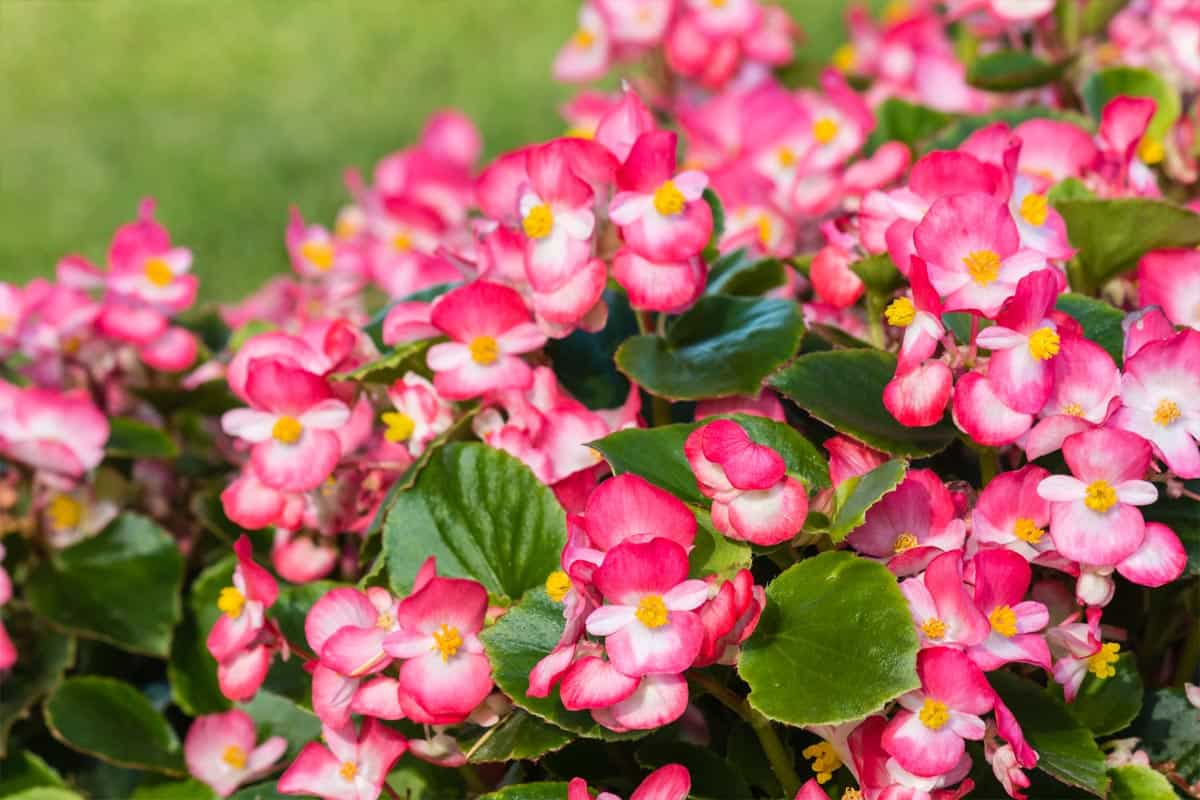
Its Latin name is Begonia x hybrida.
The pink begonia performs best in USDA plant hardiness zones 10 through 11. Position it in a spot that has partial shade to full sun. Keep the soil evenly moist but not soggy.
9. Camellia
These plants show off stunning blooms that have either single or double petal forms. Shades of pink vary from pale pink to hot pink. The plants grow between 6 and 8 feet tall.
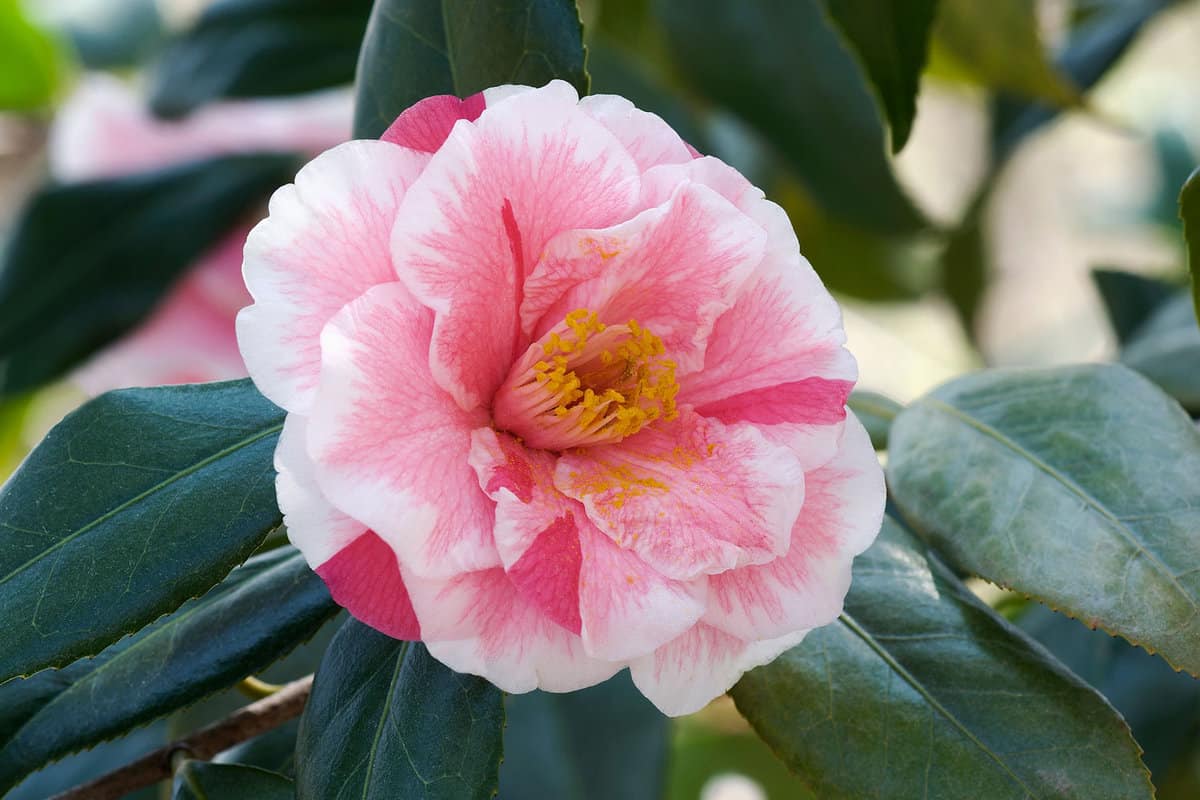
There are many pink camellia varieties available. There are Camellia sasanqua, Camellia japonica, and Camellia hybrids.
Camellias typically do best in USDA plant hardiness zones 7 through 10. The plants do well in filtered sunlight with regular deep watering.
10. Peonies
Pink peony plants feature single or double petals that look ruffled and dainty. The blooms are huge, ranging from 2 inches to 10 inches across. The plants reach between 2.5 and 3 feet tall and wide.
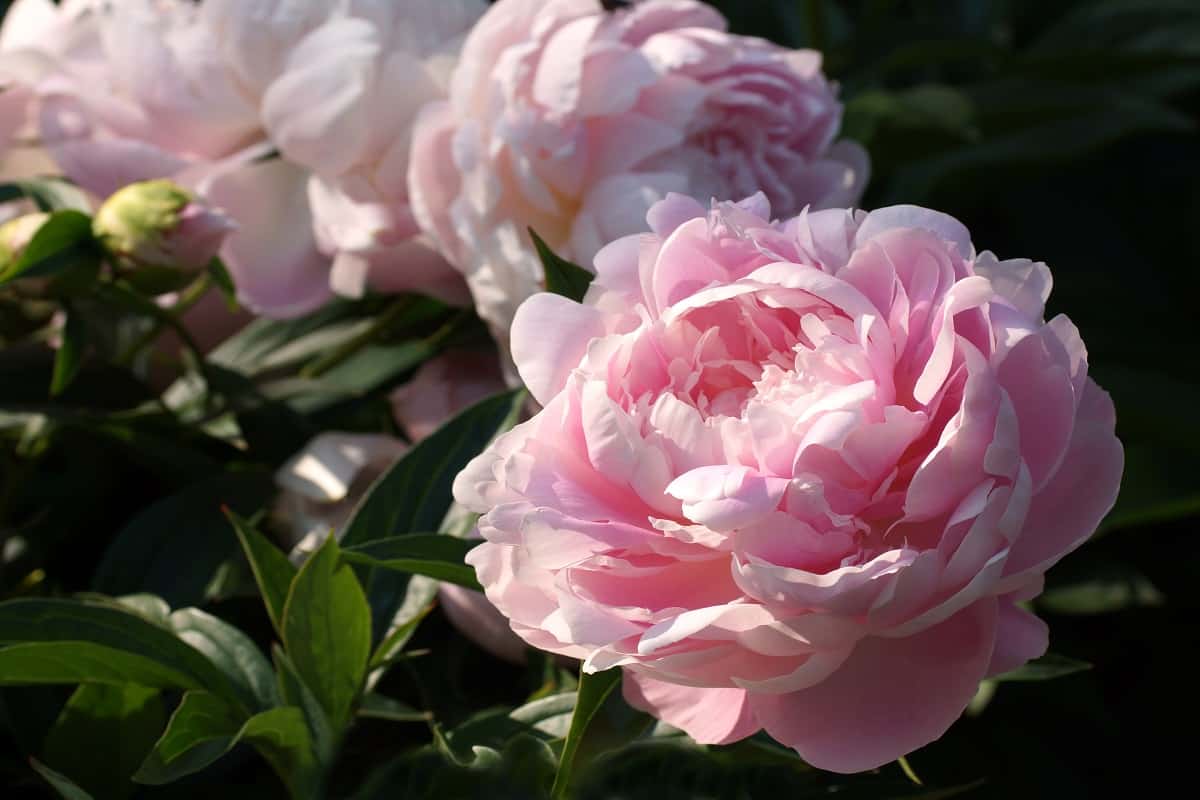
Its Latin name is Paeonia and there are many varieties within the genus.
Peonies perform best in USDA plant hardiness zones 4 through 8. Plant them in a spot that receives full sun. They need regular watering.
11. Carnations
Pink carnations are available in many sizes, shades, and varieties. Depending on the type of carnation, they can grow between 9 and 24 inches tall. The blooms measure 1-2 inches across and feature a frilly look.
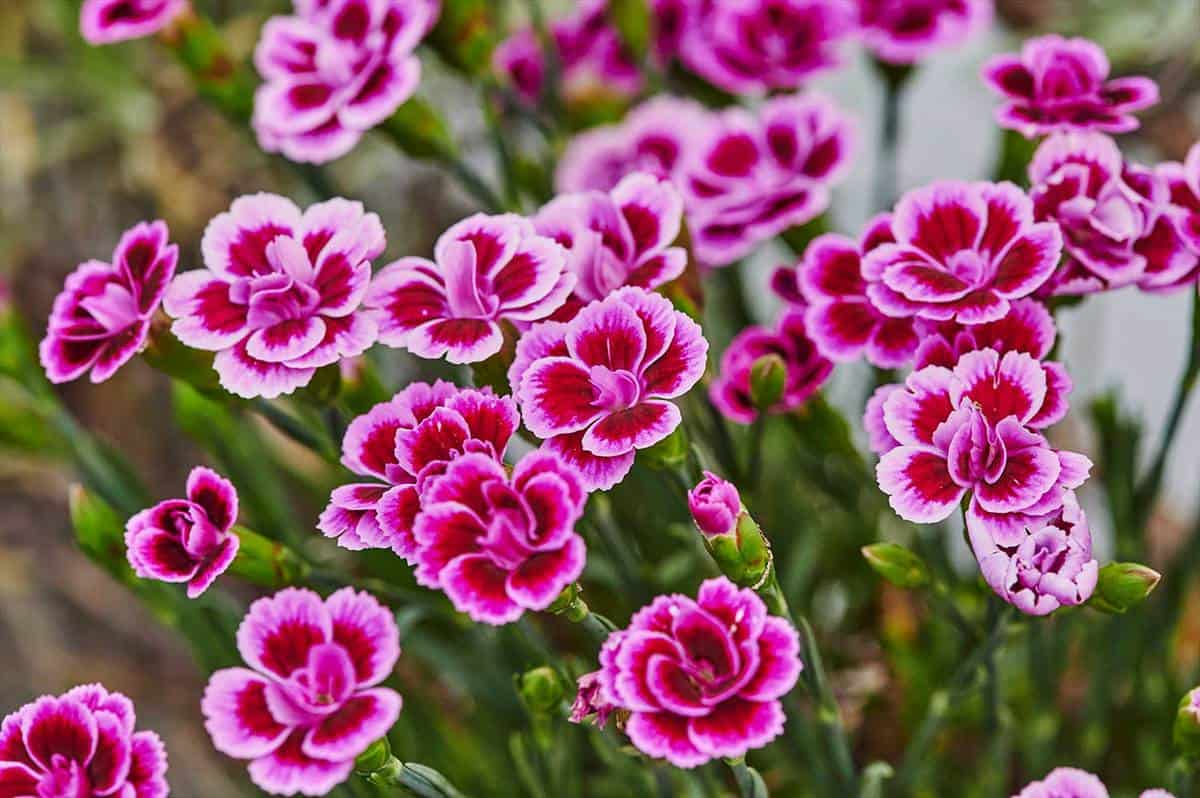
Its Latin name is Dianthus caryophyllus.
These plants perform best in USDA plant hardiness zones 5 through 9. Plant carnations in a nutrient-rich, well-draining soil that receives partial shade to full sun.
12. Clematis
Pink clematis is a vining plant with large, gorgeous pink blooms. The vines can reach over 12 feet, so plan accordingly.
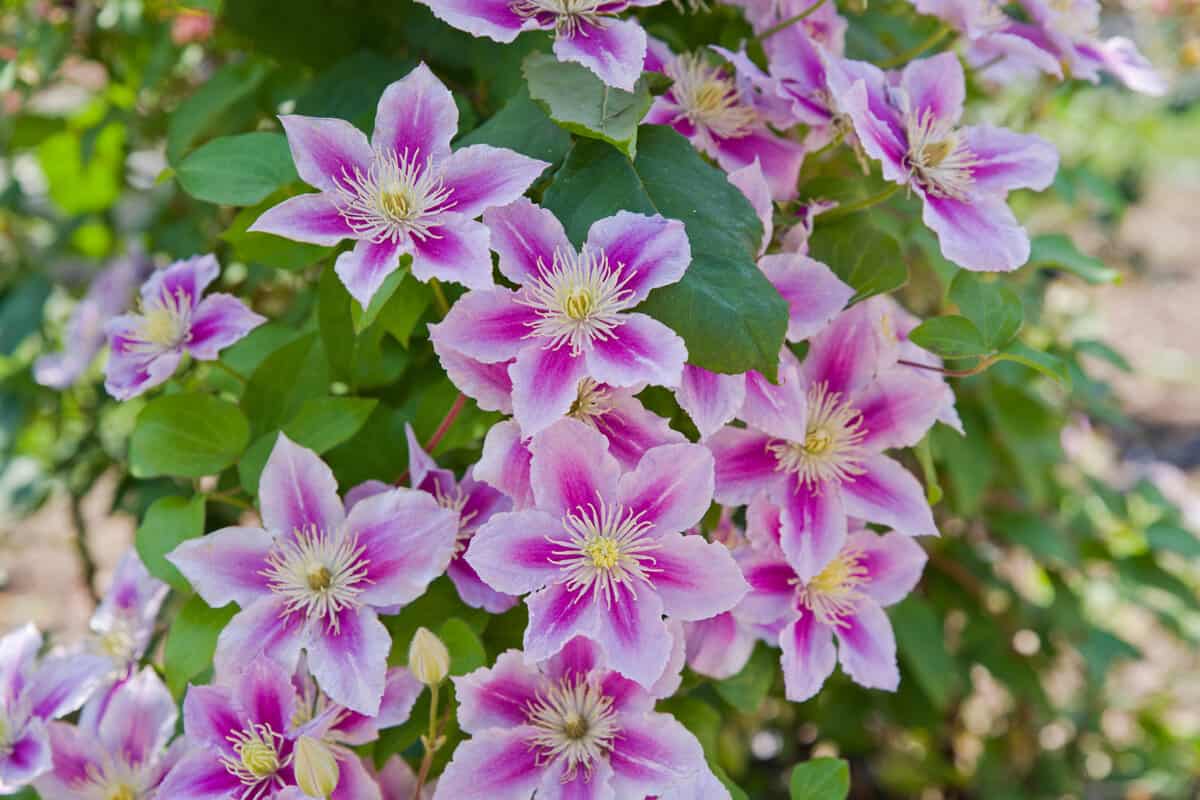
Its Latin name is Clematis spp.
The clematis plants do best in USDA plant hardiness zones 4 through 9. Plant them in a spot that receives partial or full sun. Water it regularly.
13. Coneflower
Coneflowers come in many beautiful shades, pink being one of the most vibrant. All varieties have a puffed-up center and petals that extend outward.
They can grow to a height between 2 and 5 feet.
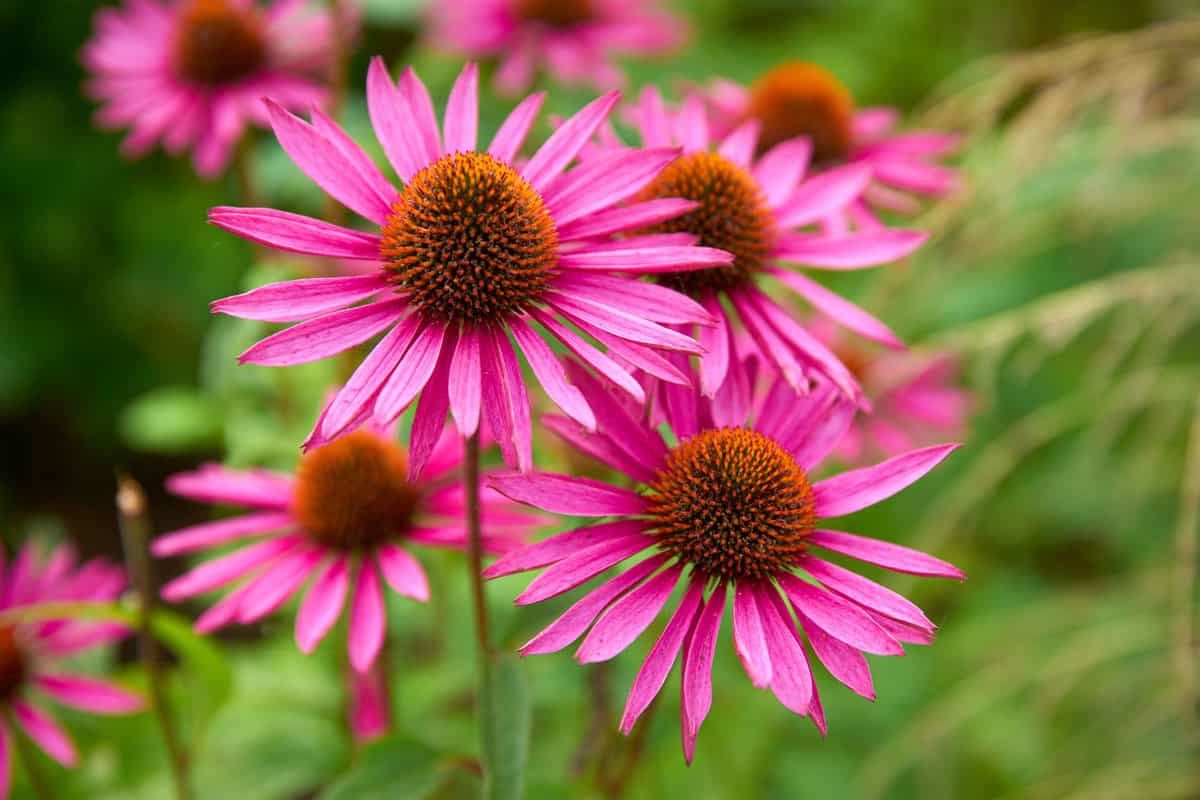
Its Latin name is Echinacea.
The flower does best in USDA plant hardiness zones 3 through 9. They need regular watering and a spot that receives 6 to 8 hours of sunlight each day.
14. Dahlia
Pink dahlias pop against their mat of dark foliage. Depending on the variety, dahlias can reach a height between 1 and 6 feet and a width between 1 and 3 feet.
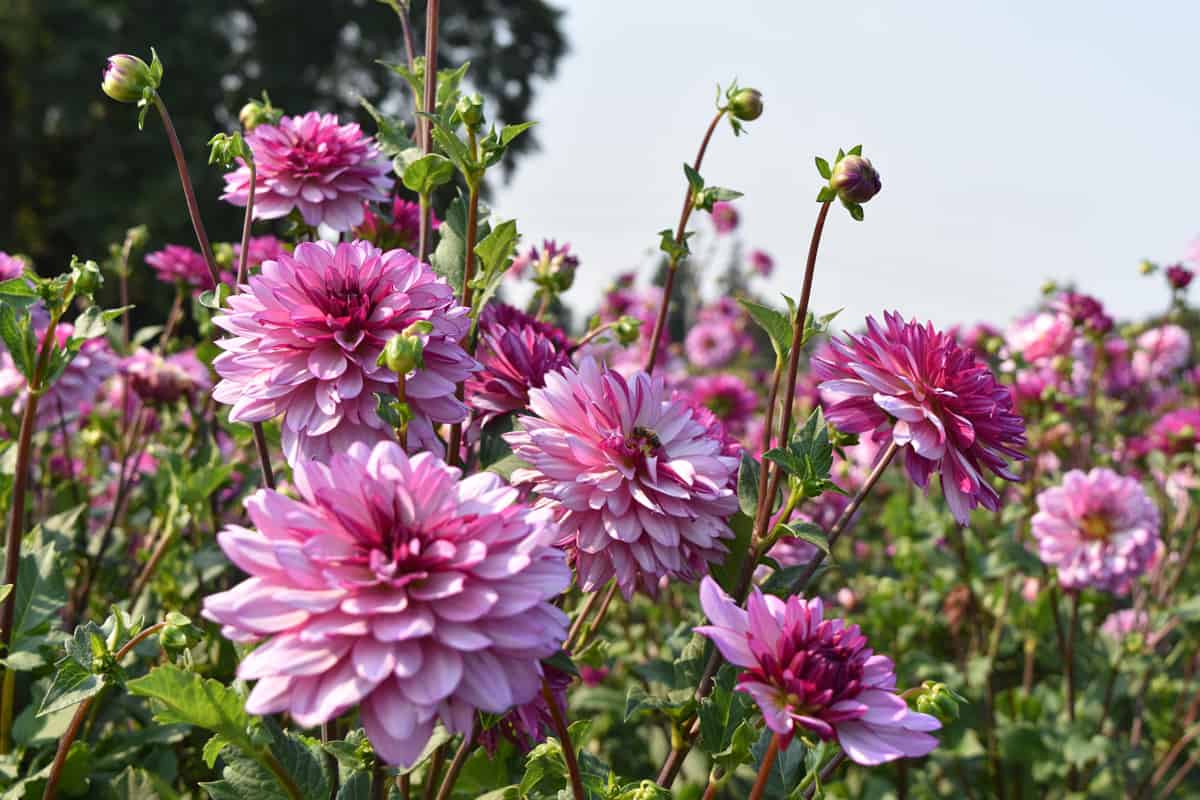
Its Latin name is Dahlia spp.
Dahlias can grow in USDA plant hardiness zones 7 through 10. Plant dahlias in a spot that receives full sun. Water them regularly.
15. Snapdragon
Lovely pink blooms decorate tall green stems. The plant reaches a height between 6 and 38 inches, depending on the variety.
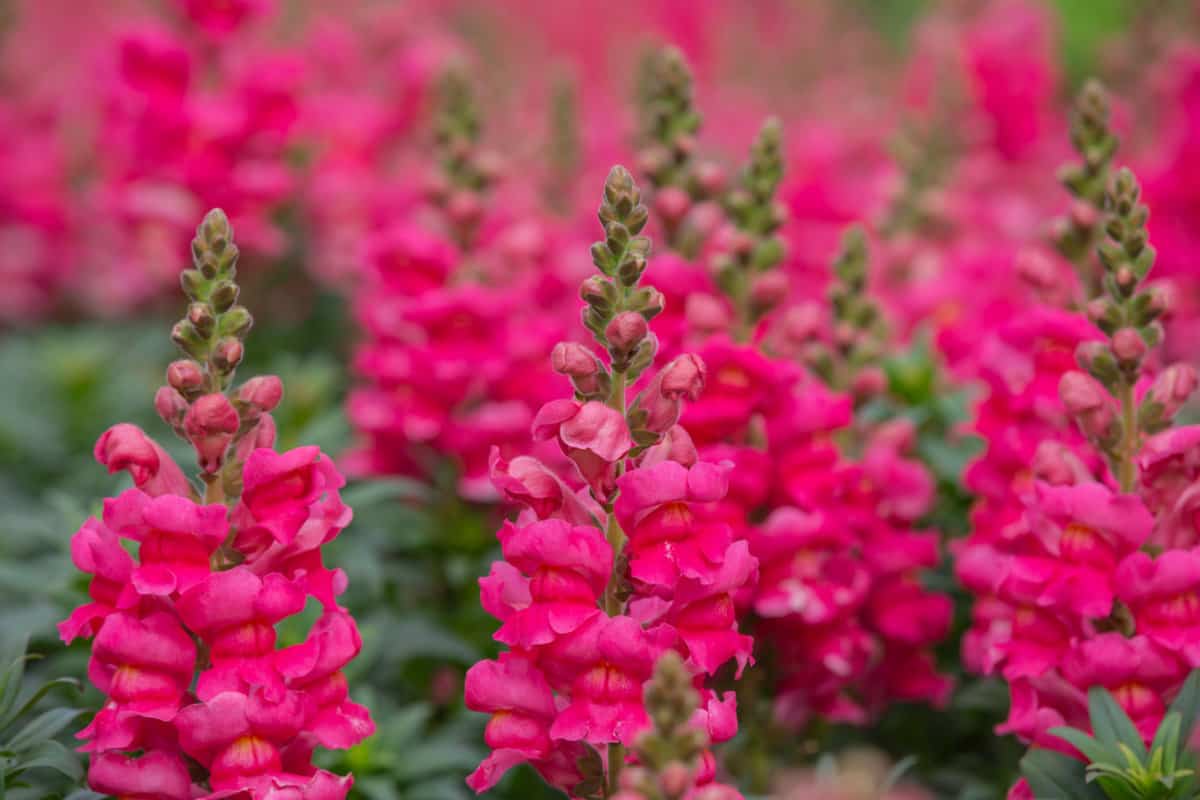
Its Latin name is Antirrhinum majus.
Plant snapdragons in USDA plant hardiness zones 8 through 9. They should be in partial shade or full sun and receive regular watering.
16. Dianthus
Dianthus plants come in many varieties. They can have a trailing, mounding, or upright habit of growth. The blooms may be single or double. The edges of all the petals are frilly.
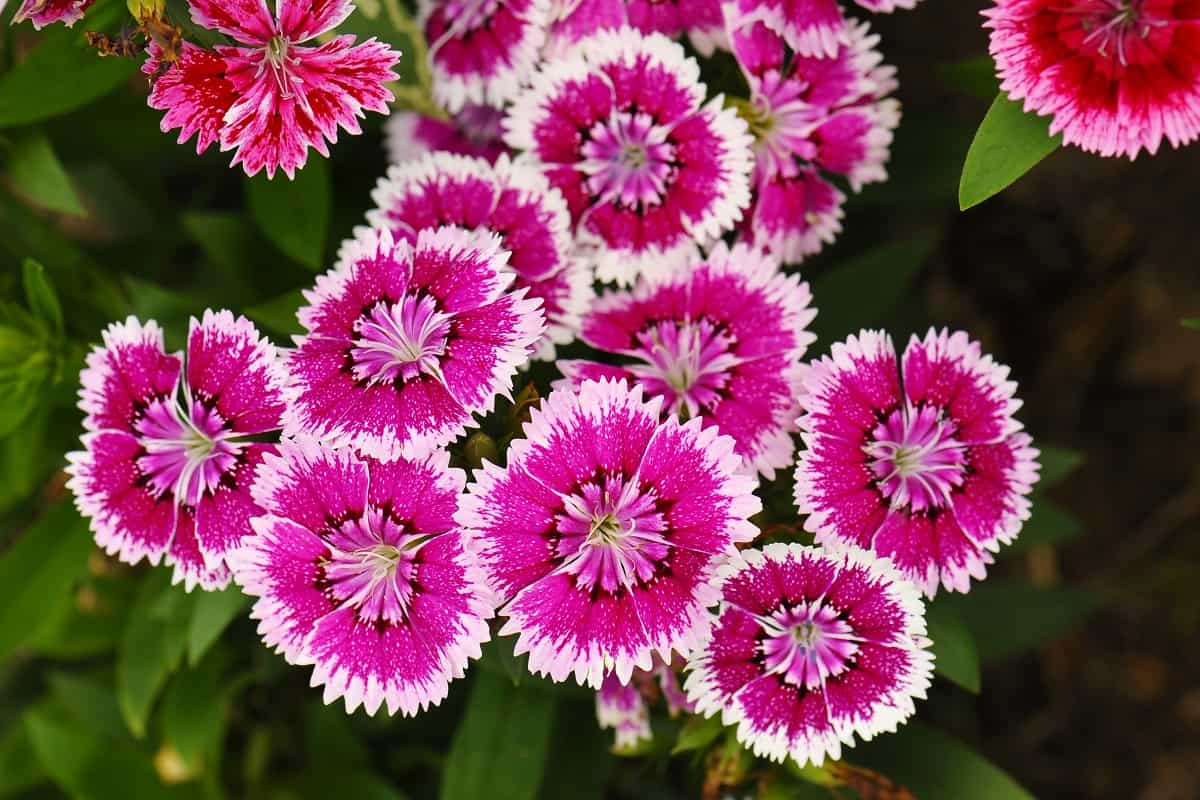
Its Latin name is Dianthus spp.
These plants perform best in USDA plant hardiness zones 3 through 9. Plant them in full sun and water them regularly.
17. Hibiscus
Hibiscus plants feature unforgettable tropical flowers that measure 3 to 5 inches across. The plant can grow between 3 and 4 feet in height and width.
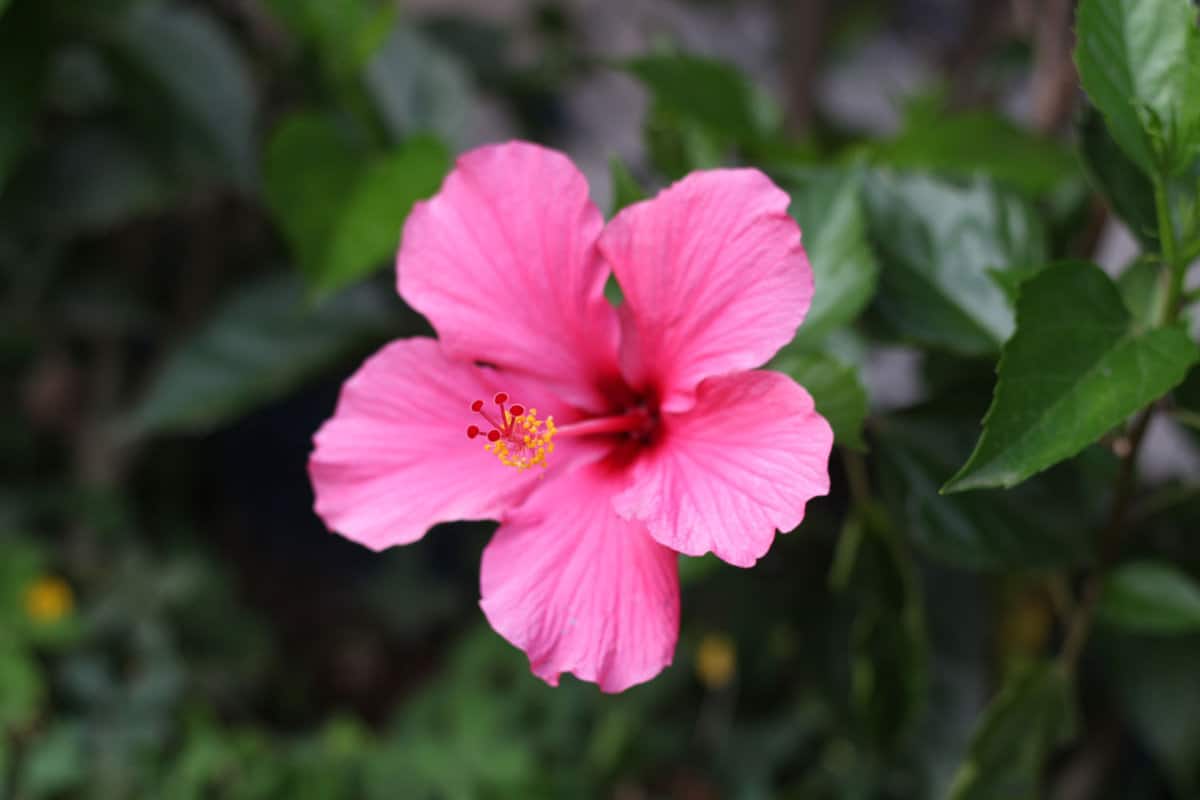
Its Latin name is Hibiscus moscheutos.
Hibiscus plants do best in USDA plant hardiness zones 4 through 10. The soil should be watered regularly and kept moist. Plant them in a spot that gets full sun.
18. Oriental Lily
The oriental lily is known for its large, fragrant blooms. The petals are slightly ruffled and show off an intricate pattern. Its foliage is green and glossy.
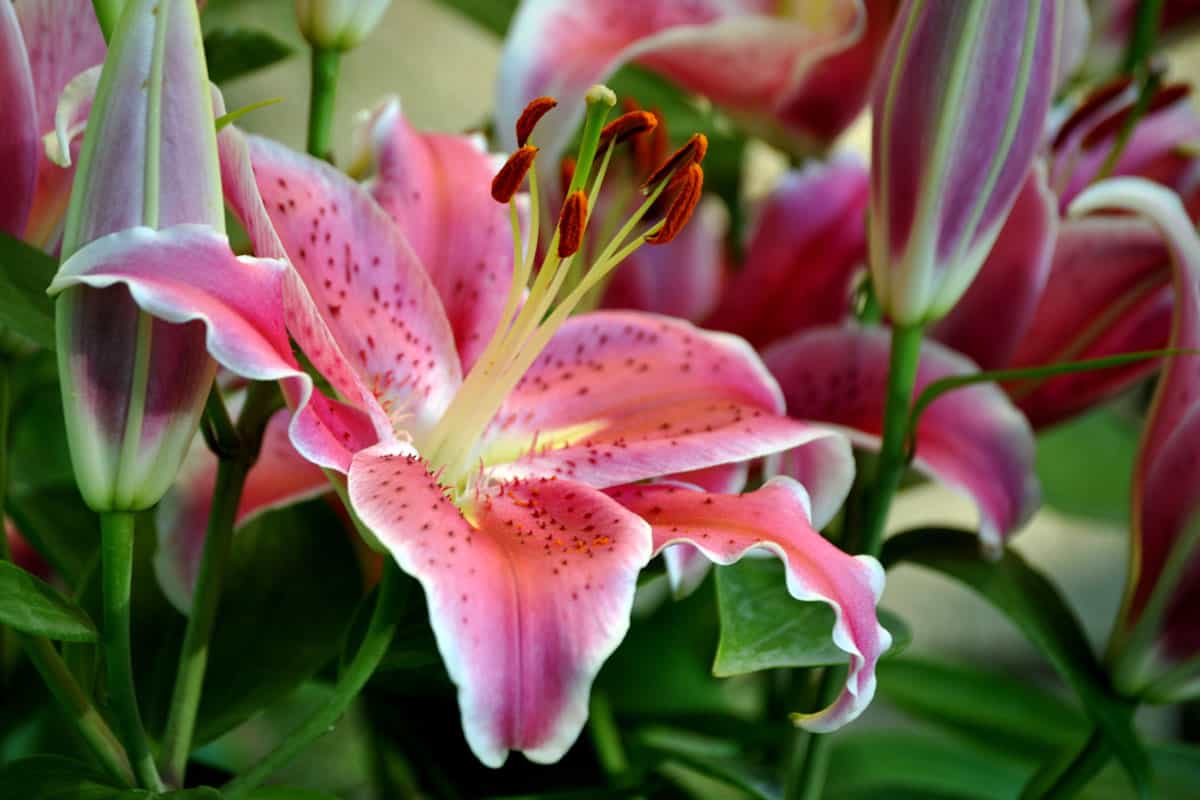
Its Latin name ie Lilium.
The oriental lily performs best in USDA plant hardiness zones 4 through 9. The plant should be regularly watered and in a spot that receives full sun.
19. Petunia
Petunias are a garden favorite. The trumpet-shaped blooms feature all kinds of colors; the shades of pink are striking. The plants grow to about 7 inches tall.
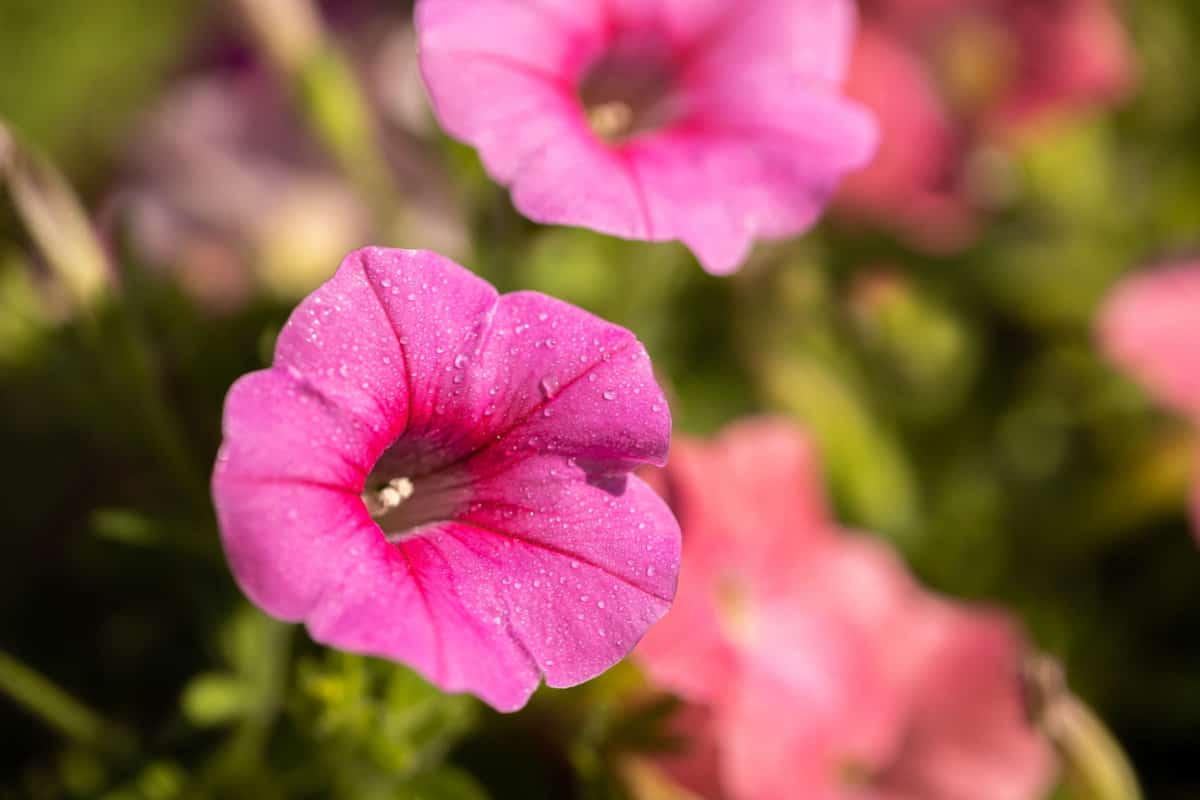
Its Latin name is Petunia spp.
Petunias do best in USDA plant hardiness zones 9 through 11. The plants need full sun and an even supply of water.
20. Tulip
Tulips are cup-shaped flowers that extend from long, single stems. The vibrantly-colored plant looks eye-catching especially when planted en masse. The colorful blooms stand out against the bright green foliage.
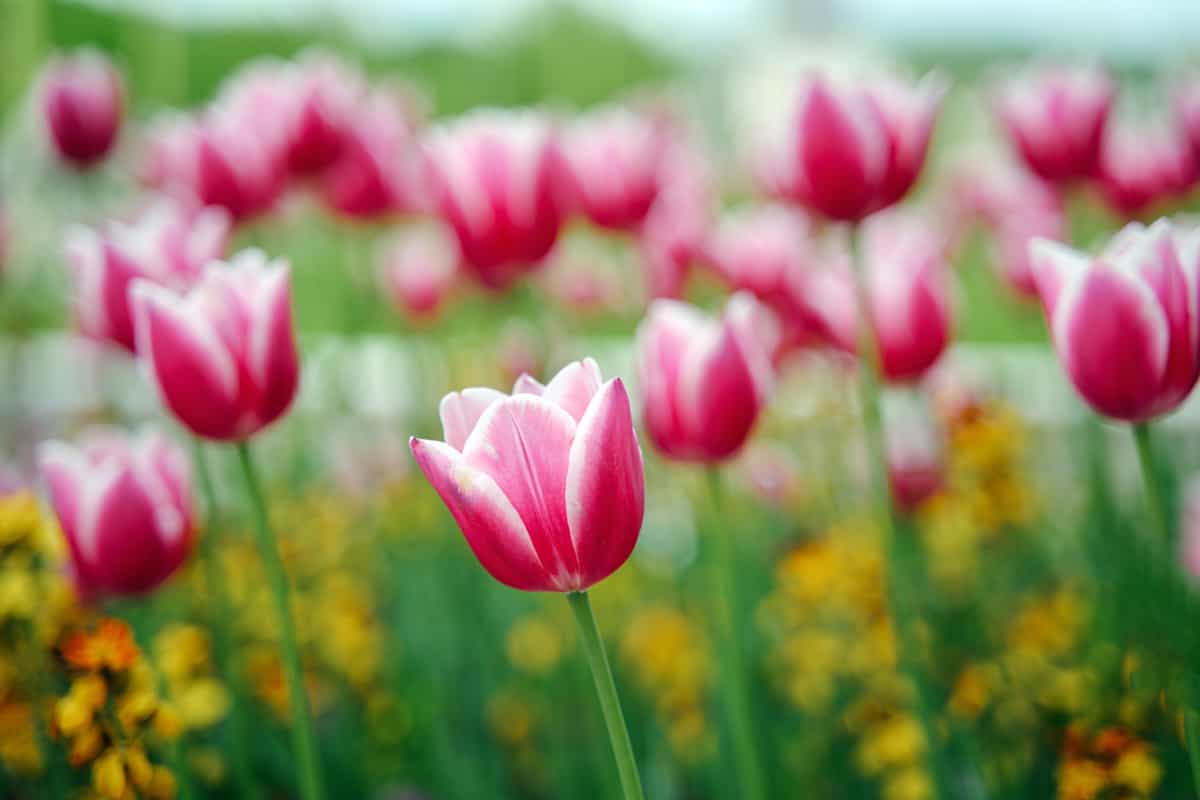
Its Latin name is Tulipa.
These plants perform best in USDA plant hardiness zones 3 through 8. They can thrive in partial or full sun. The soil needs to be well-draining.
21. Vinca
The vinca plant features small, colorful blooms that sit atop glossy green foliage.
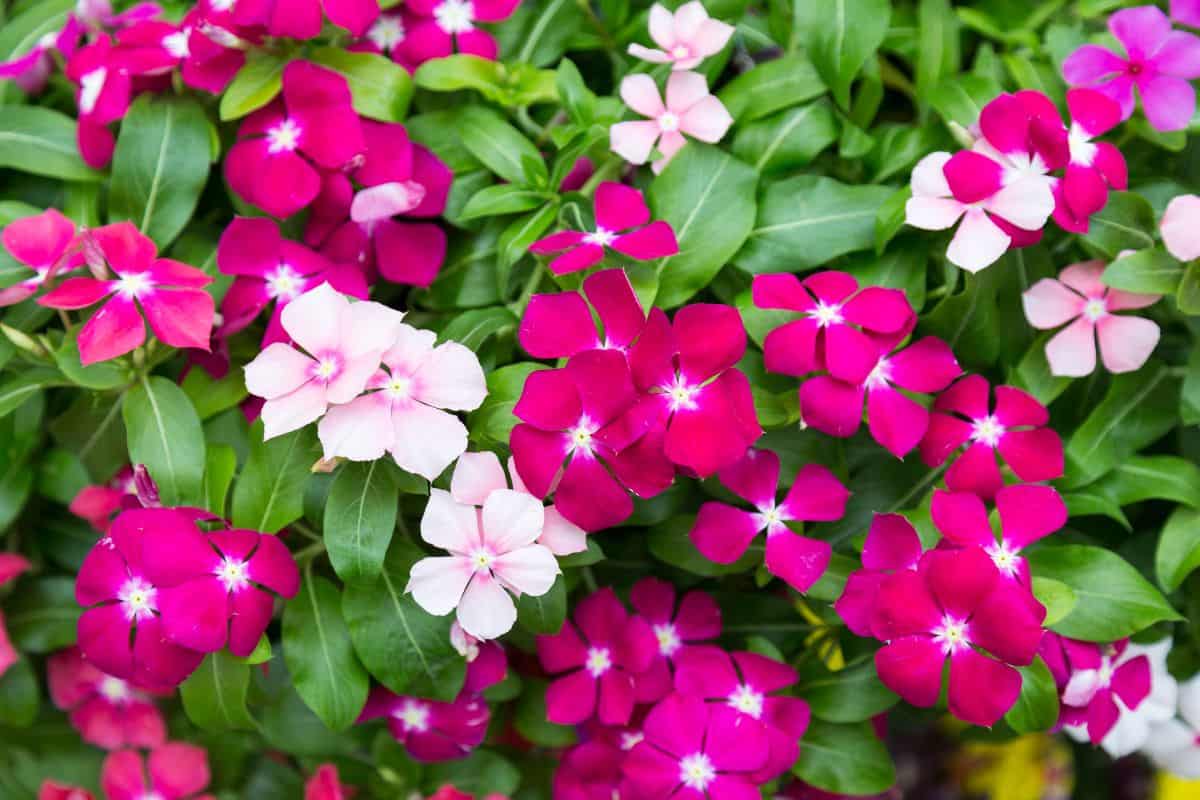
It grows to a height between 6 inches to 3 feet and a width between 8 and 36 inches.
Its Latin name is Catharanthus roseus.
Vinca is well-suited for USDA plant hardiness zones 2 through 11. Plant them in a spot that receives full sun if possible.
22. Calla Lily
Calla lilies have a tropical look to them with its funnel-like flowers. Its foliage is smooth and sword-like. The plants can stand up to 3 feet tall.
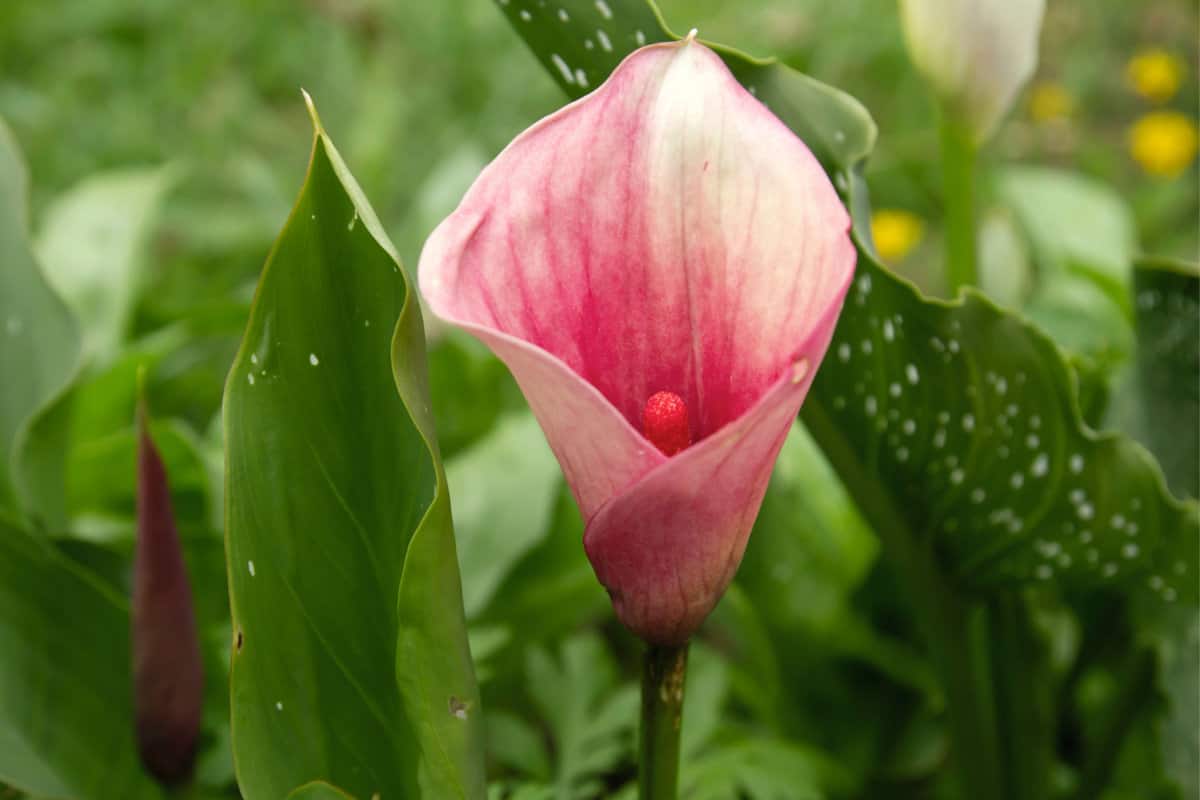
Its Latin name is Zantedeschia spp.
The calla lily performs best in USDA plant hardiness zones 8 through 11. It only needs watering when the soil gets slightly dried out. Full sun or partial shade is ideal.
23. Chrysanthemum
Chrysanthemums signify the beginnings of fall. The flowers have many layers of petals and come in vibrant colors. The foliage is dense and mounded.
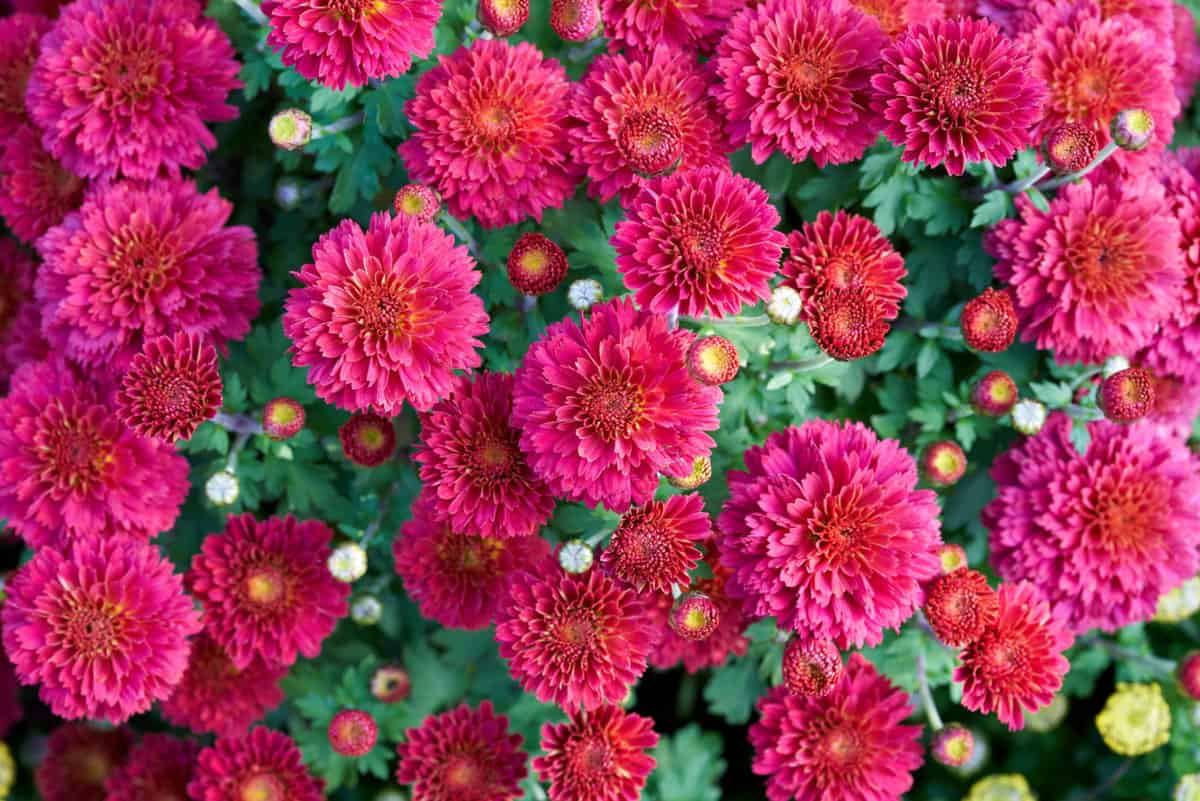
Its Latin name is Chrysanthemum morifolium.
Chrysanthemums do best in USDA plant hardiness zones 3 through 9. They need to be in a spot with full sun. They'll need regular watering.
24. Meadowsweet
Meadowsweet is a perennial, edible flowering herb. Its 3-foot stalks are dark green and look hairy. It has tufts of small flowers that sit on top.
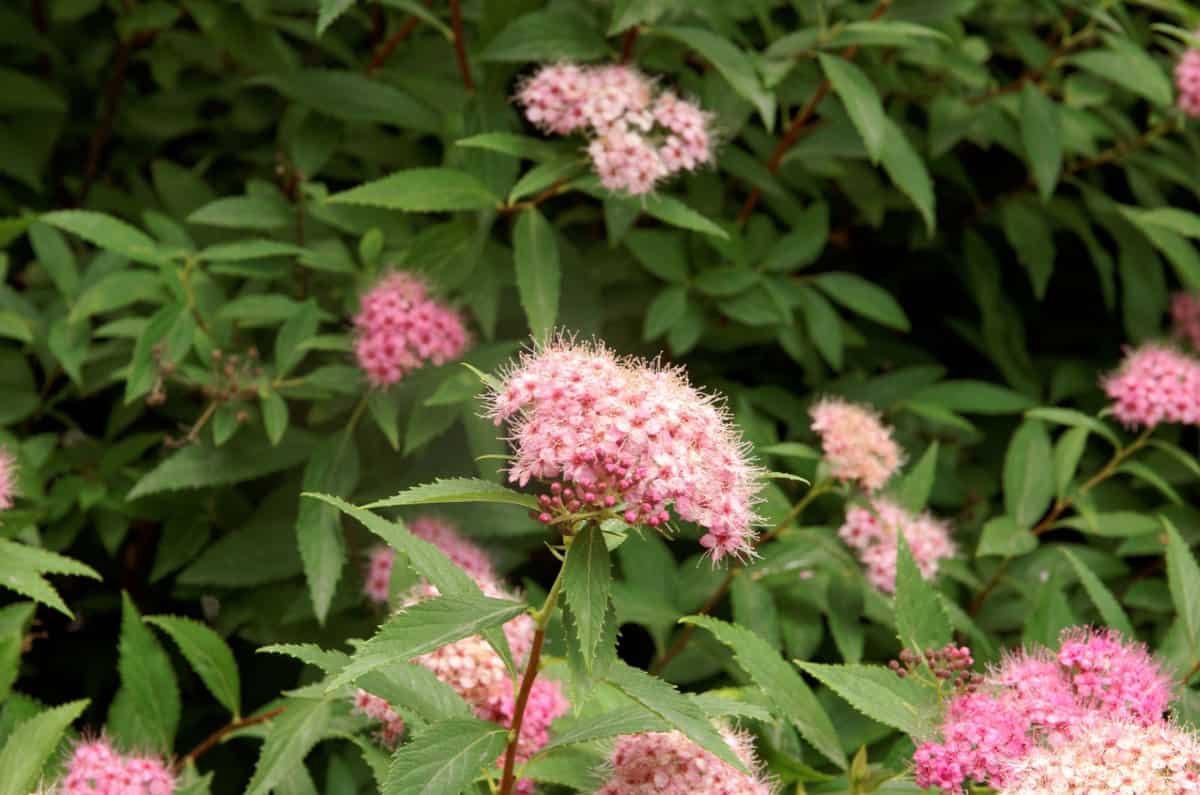
Its Latin name is Filipendula ulmaria.
The meadowsweet plant does best in USDA plant hardiness zones 3 through 9. Plant it in a spot that receives partial to full sun.
25. Hollyhock
Hollyhock is a genus with over 60 varieties in it. The tall spikes produce many colorful cup-shaped blooms.
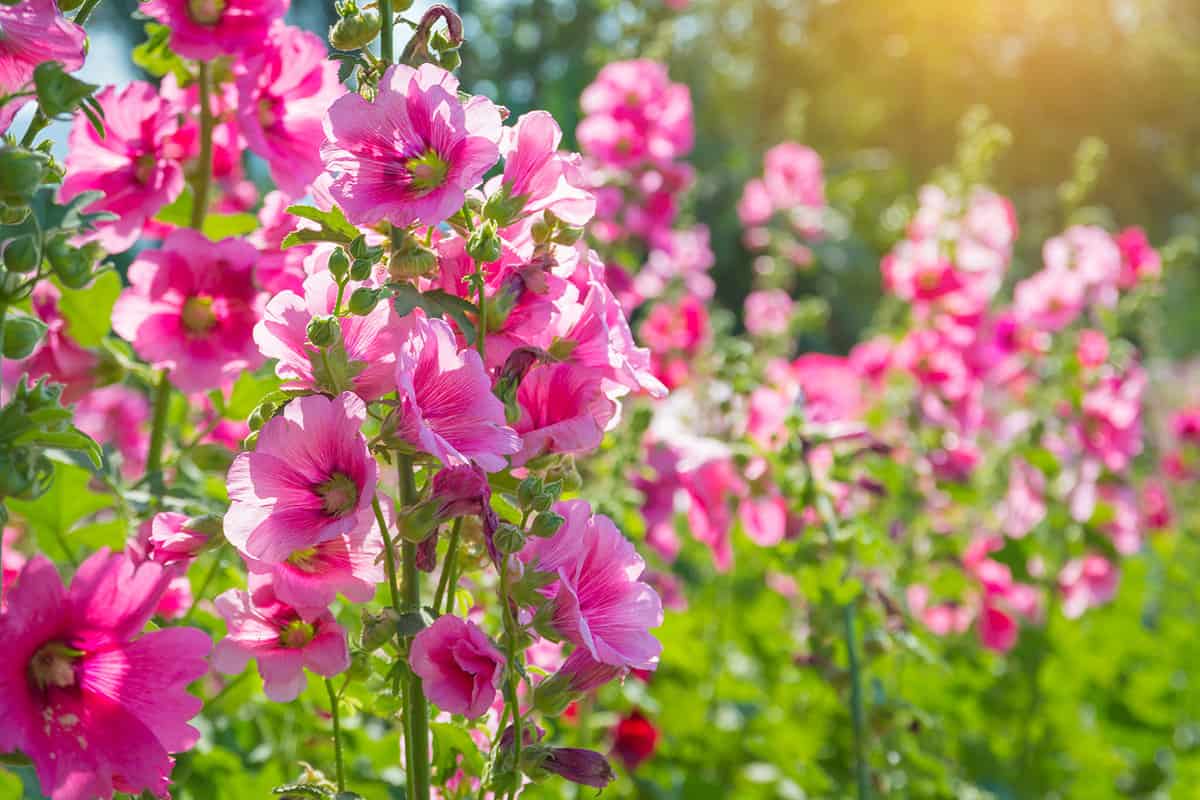
Its Latin name is Alcea rosea.
Hollyhocks do best in USDA plant hardiness zones 3 through 8. They need partial to full sun to thrive. The soil needs to be rich in nutrients and well-draining.
26. Hyacinth
Hyacinth plants are small but colorful. They don't exceed 1 foot tall, but their whole spike consists of small prolific blooms.
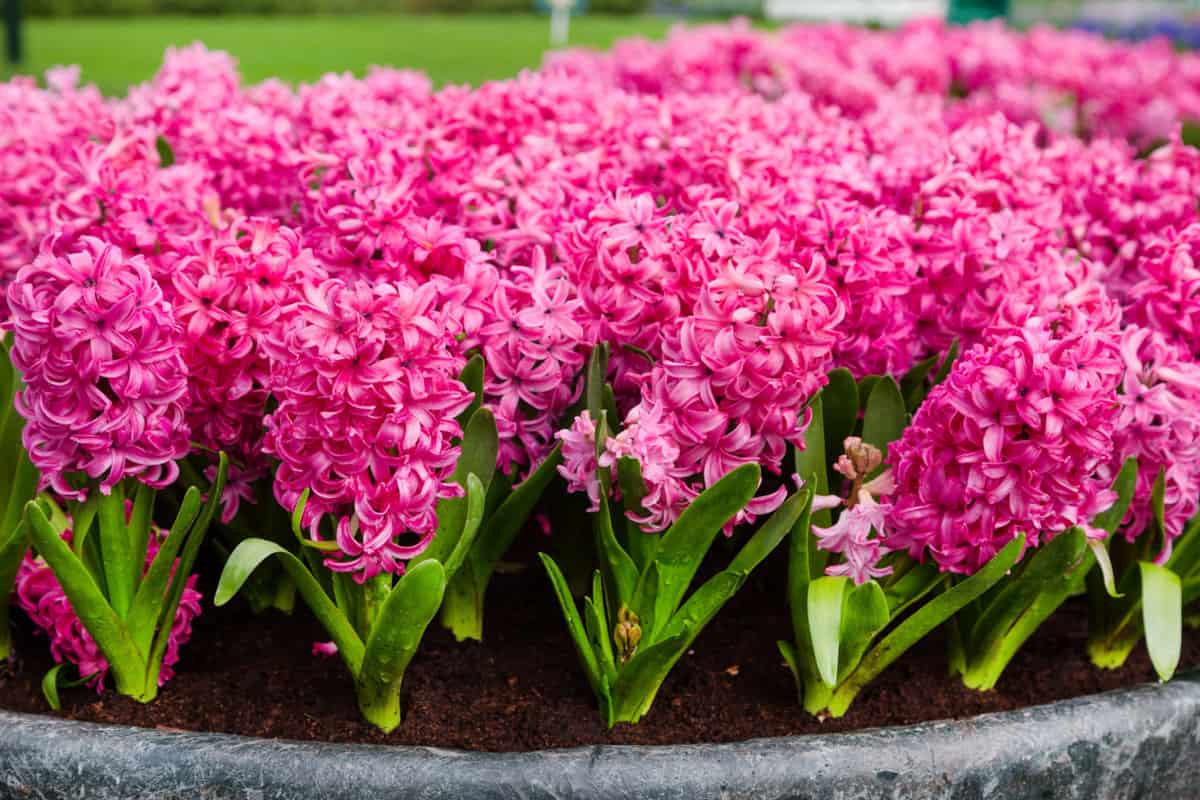
Its Latin name is Hyacinthus orinetalis.
Hyacinths can grow in USDA plant hardiness zones 3 through 9. Plant them in a spot that receives partial to full sun. Water them regularly.
27. Orchid
Orchids are beautiful, ornate, exotic plants that feature small blooms at the end of a spindly stem. The blooms are also wonderfully fragrant.
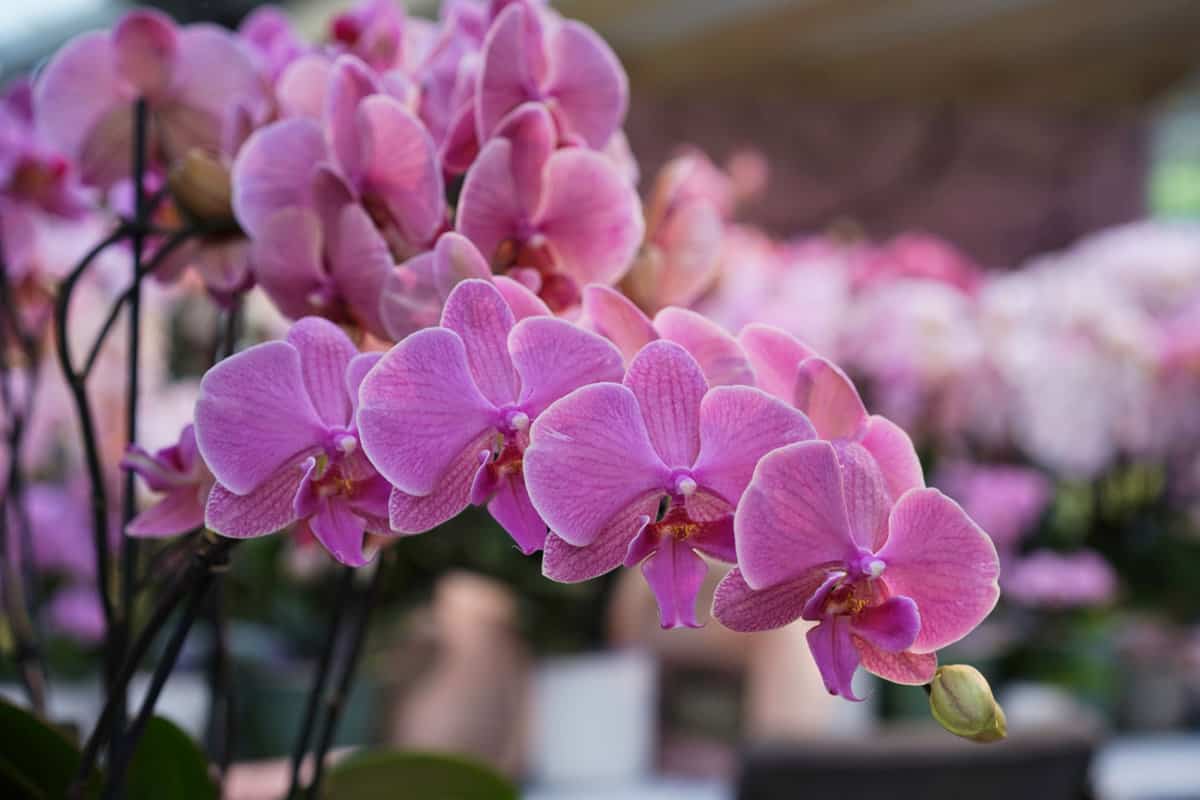
Its Latin name is Orchidaceae.
Optimally, orchids should get between 12 and 14 hours of sunlight each day. Water orchids once a week. High humidity is ideal.
28. Primrose
Primrose flowers can be seen in a variety of sizes, shapes, and varieties. Small flowers extend from vibrant green foliage.
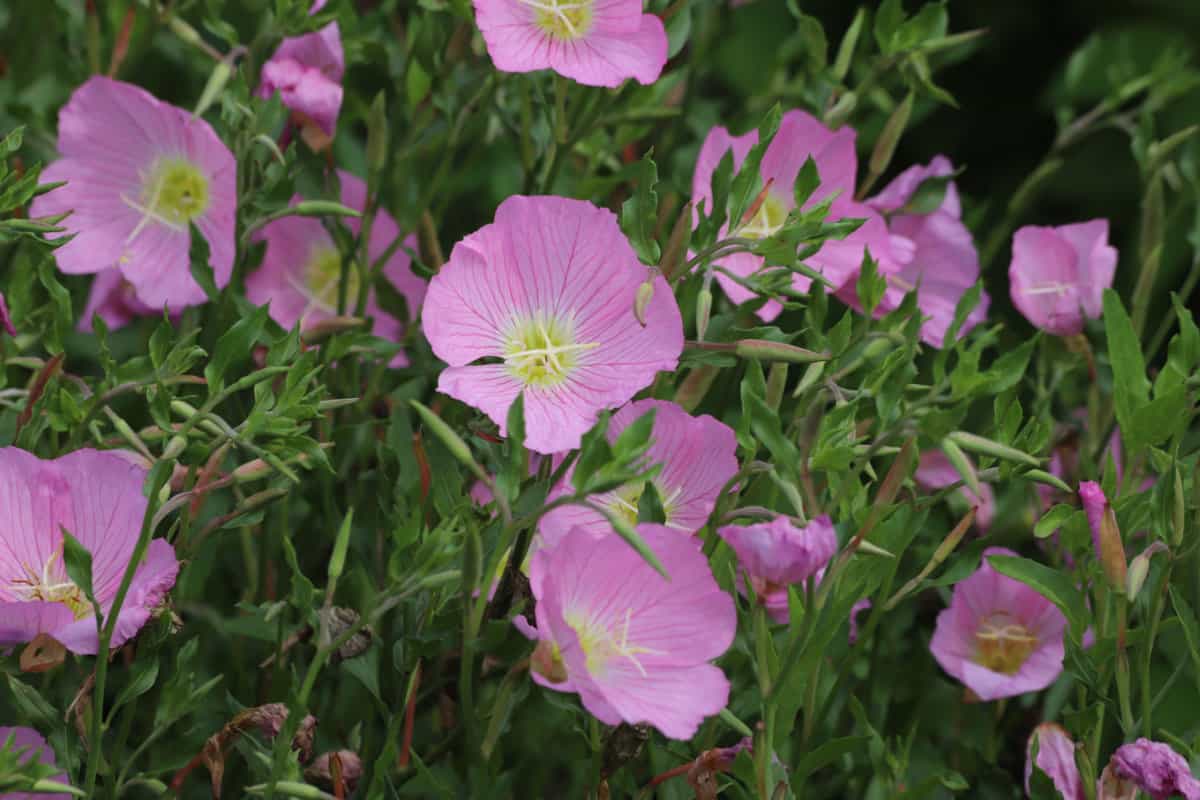
Its Latin name is Primula polyantha.
Primrose plants do best in USDA plant hardiness zones 4 through 8. They're hardy plants that don't require much care. Light shade and well-draining soil are ideal.
29. Spider Lily
The spider lily is a funnel-shaped flower with curling petals and stamens. These unique flowers have no foliage and seem to simply pop up out of the ground.
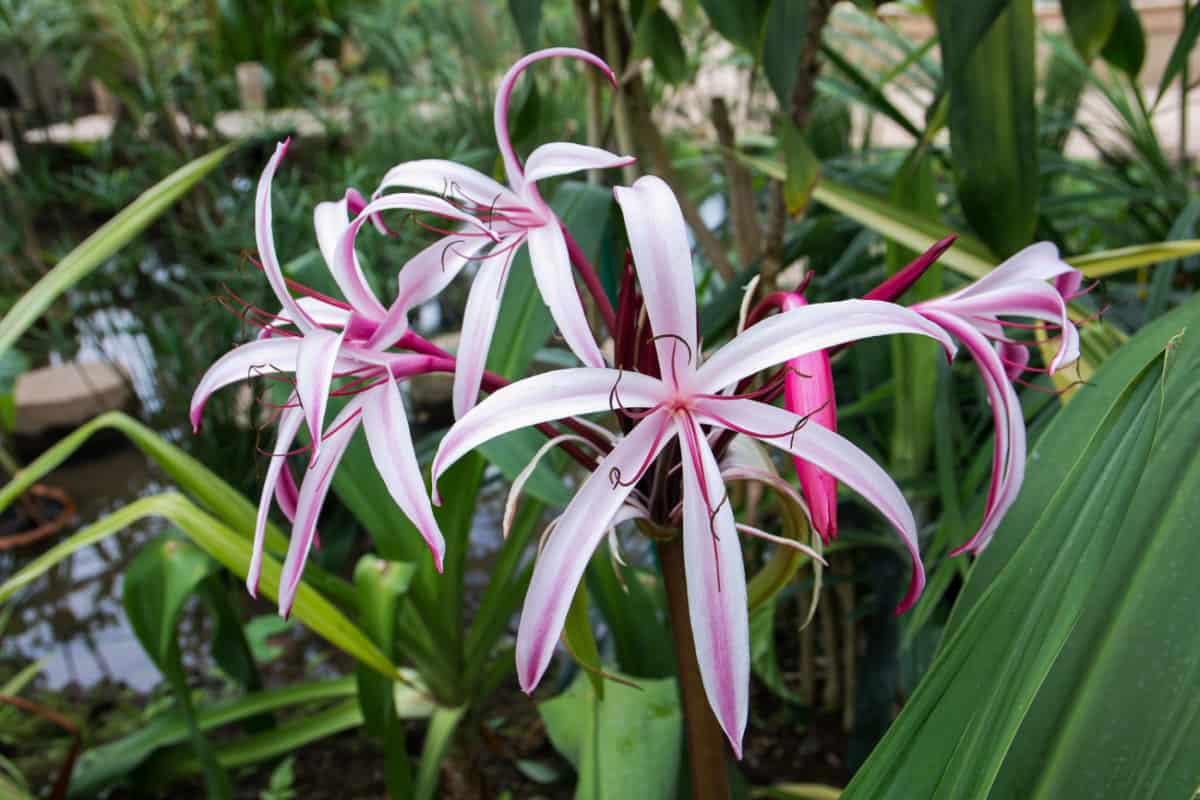
Its Latin name is Lycoris.
These lilies perform best in USDA plant hardiness zones 5 through 9. Plant them in a spot that receives partial to full sun and water them regularly.
30. Rock Trumpet
These tropical plants have a vining habit of growth and display gorgeous trumpet-shaped flowers. Its foliage is bright green and glossy.
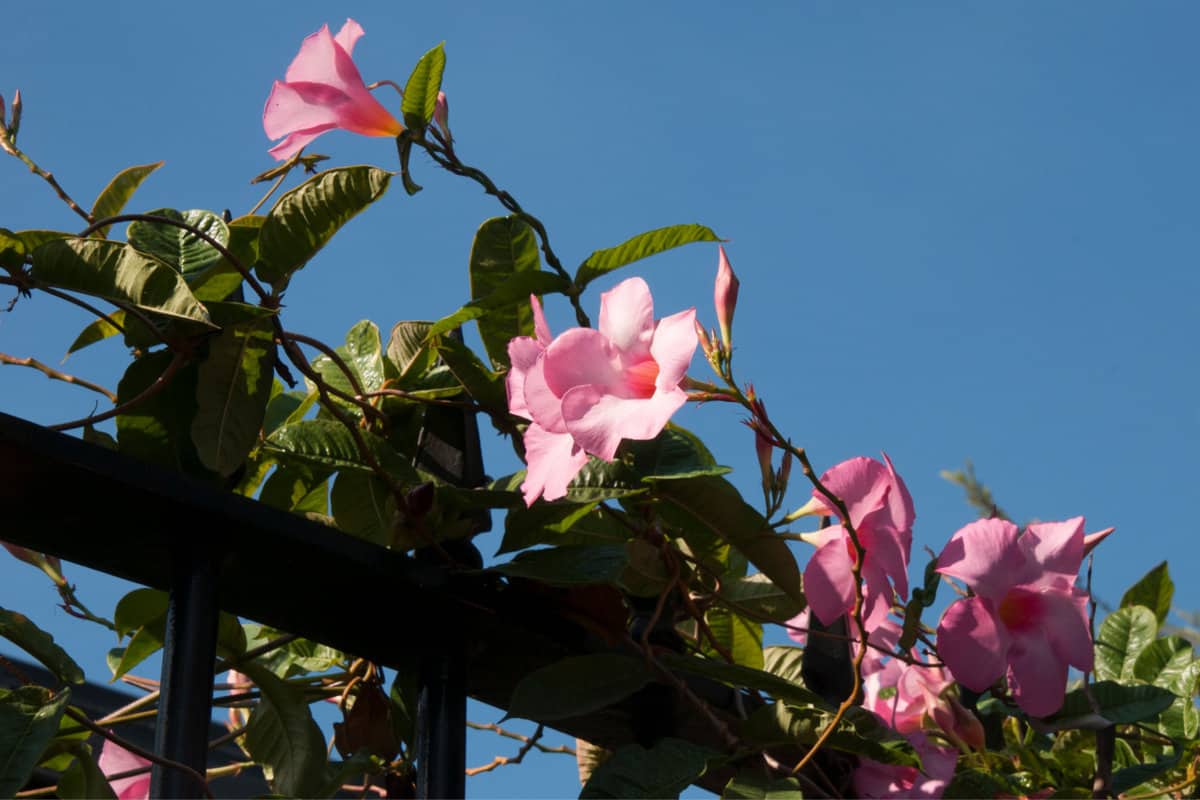
Its Latin name is Mandevilla.
These plants do best in USDA plant hardiness zones 9 and above. They love the sun, regular watering, and well-draining soil.
31. Sweet Peas
Sweet peas are fragrant, low-growing plants with thin foliage and dainty blooms. The delicate ruffled flowers are vibrant and eye-catching.
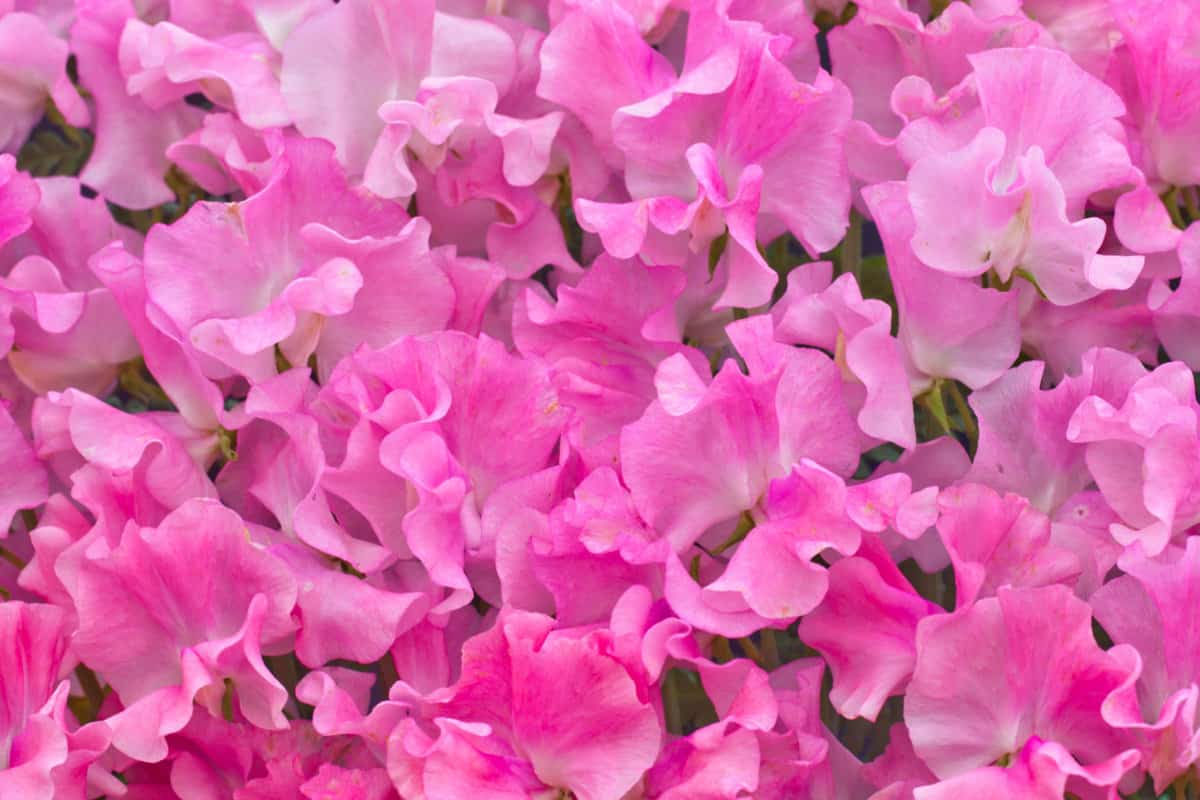
Its Latin name is Lathyrus odoratus.
Sweet peas can be grown in USDA plant hardiness zones 7 and above. For optimal health, sweet peas should be planted in full sun. They also need moist, well-draining soil.
32. Zinnia
Zinnias put forth large, vibrantly-colored blooms with layers of petals. Some varieties are low-growing while others stand tall.
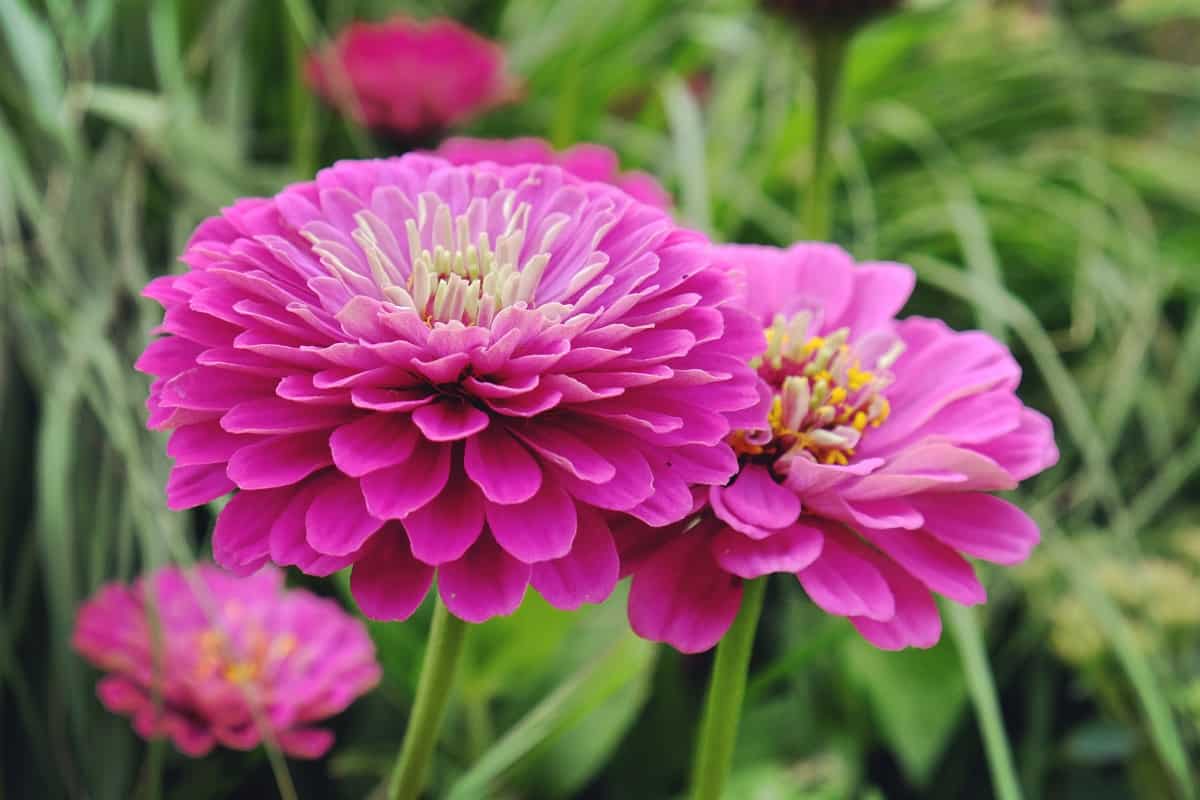
Its Latin name is Zinnia elegans.
These plants do best in USDA plant hardiness zone 11. Zinnia plants need well-draining soil and occasional watering. Plant them in a spot that receives full sun.
33. Hydrangea
Hydrangeas make for the perfect flowering shrub. Enormous clusters of small flowers emerge from dense glossy green foliage in a mounding habit.
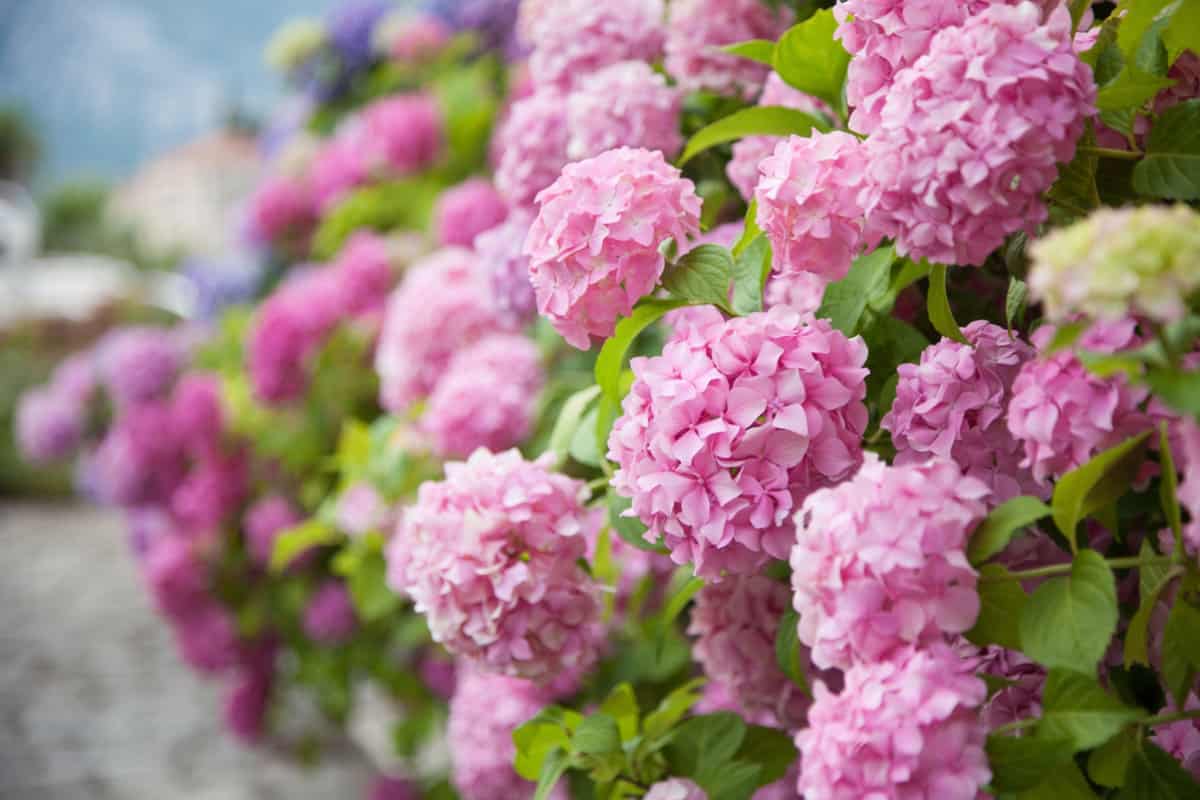
Its Latin name is Hydrangea spp.
Hydrangeas do well in USDA plant hardiness zones 3 through 9, depending on the variety. The plants should be watered regularly and positioned in a spot that receives partial sun.
34. Lotus
The lotus flower is a unique aquatic perennial. Its petals are very distinct in their shape and how they grow. The leaves can spread out to 3 feet long on top of the water.
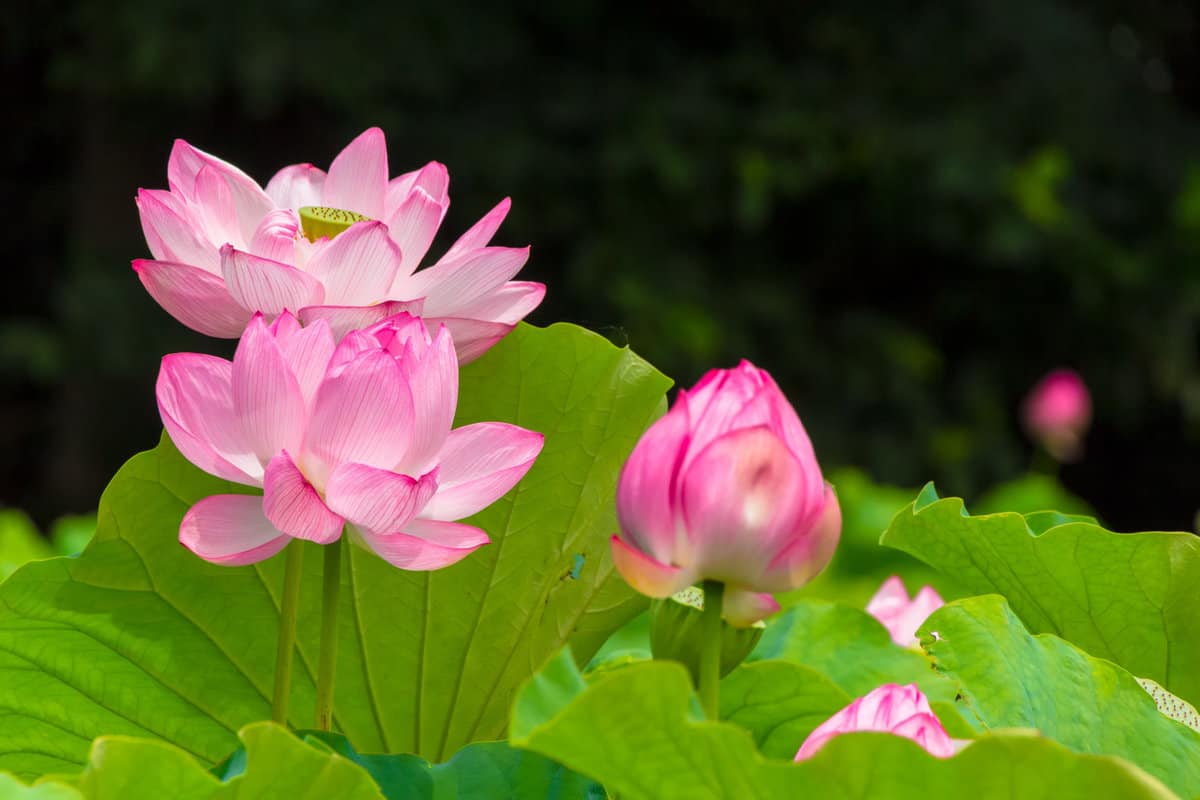
Its Latin name is Nelumbo nucifera.
The lotus needs at least 6 hours of sunlight each day, but ideally more. Tropical climates are ideal for their health.
35. Roses
Roses are one of the most classic flowers. These flowers can be mounding, climbing, or groundcovers. Regardless of the way they grow, they show off plenty of colorful, elegant blooms.
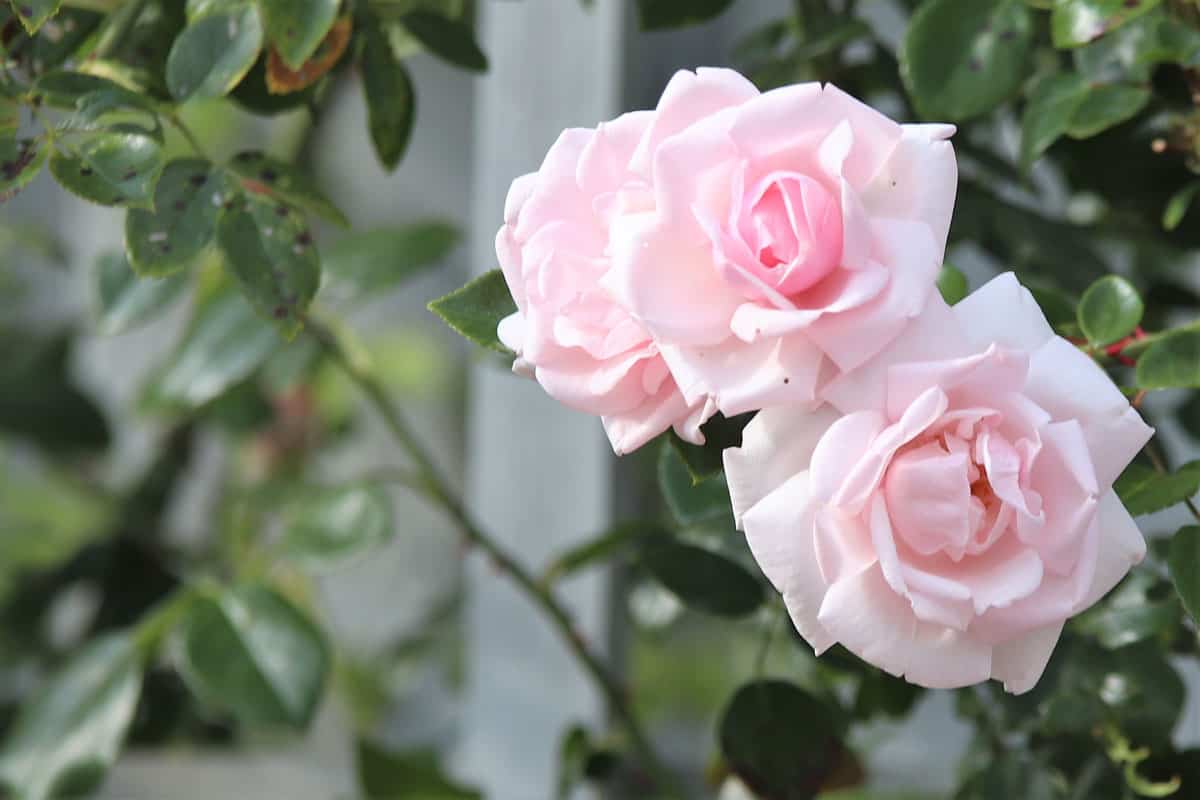
Its Latin name is Rosa spp.
Roses do best in USDA plant hardiness zones 4 through 11, depending on the variety. Roses need plenty of sunlight and soil that's well-draining. They also need to be watered regularly to have evenly moist soil.
In Closing
Stunning pink flowers make for wonderful additions to the garden. So, if you're looking for a nice pop of color, look no further than the gorgeous options in this post.

Before you go, be sure to check out these other gardening guides that may interest you:
